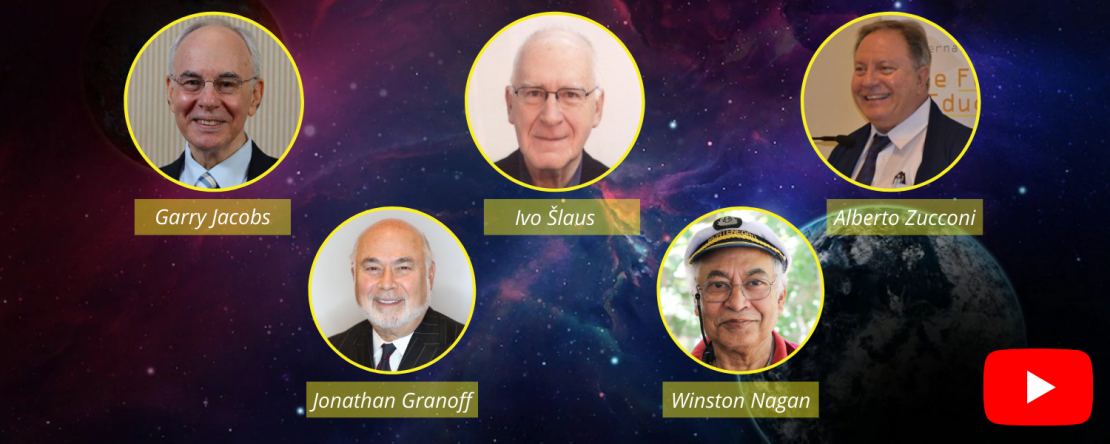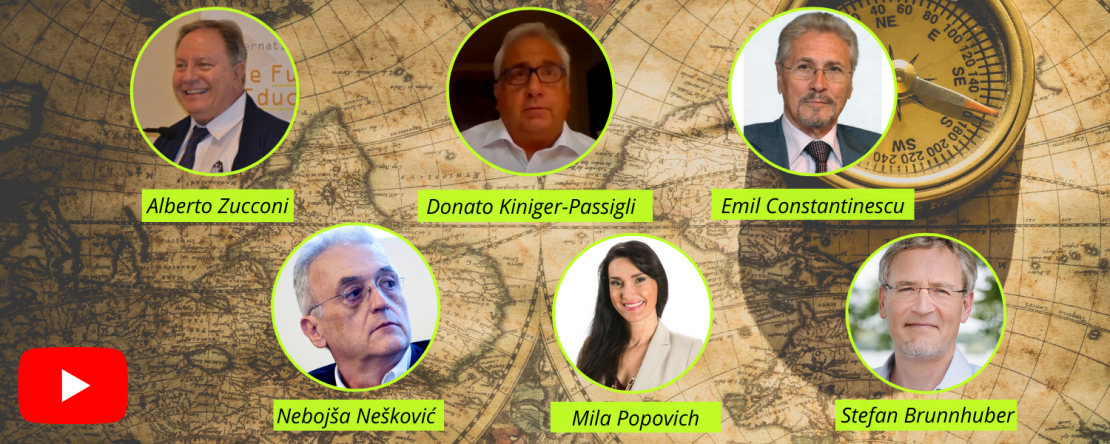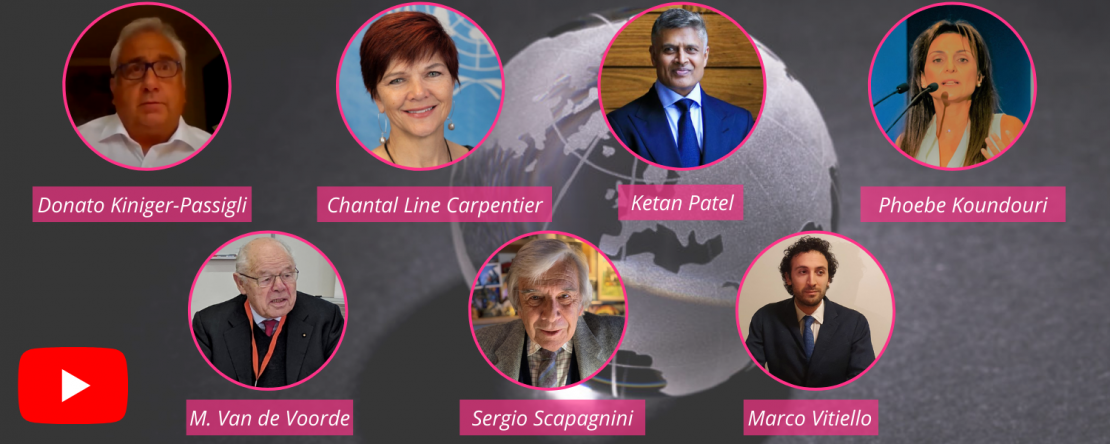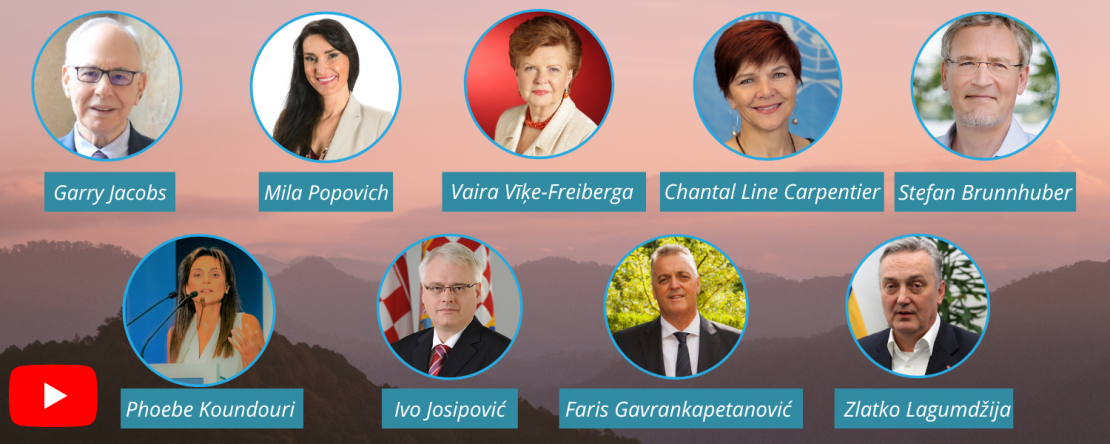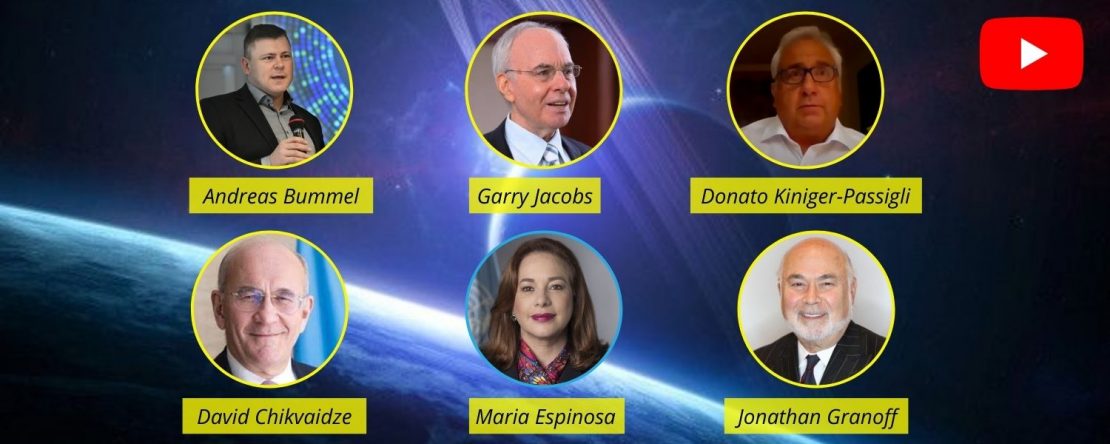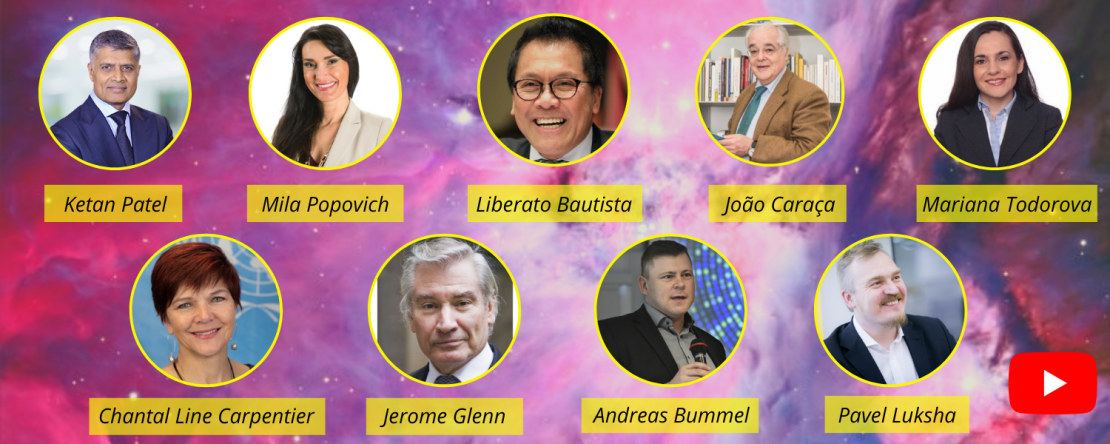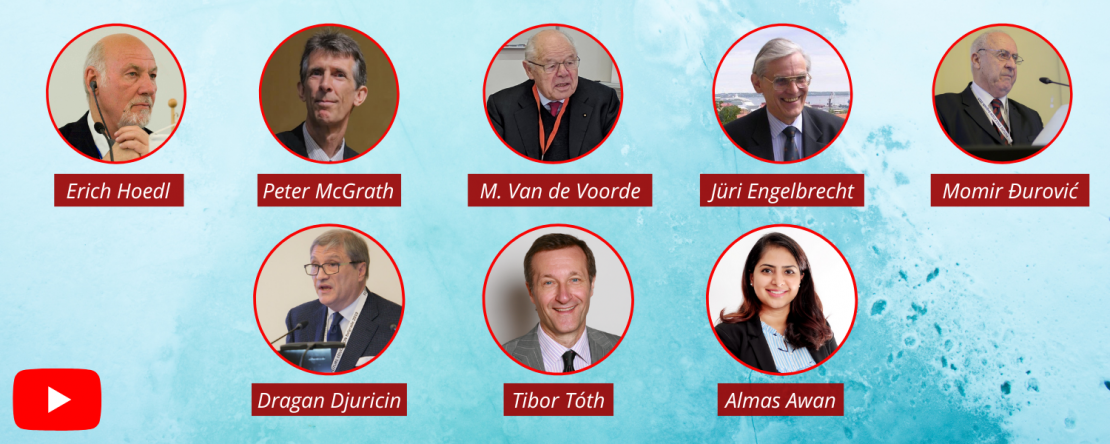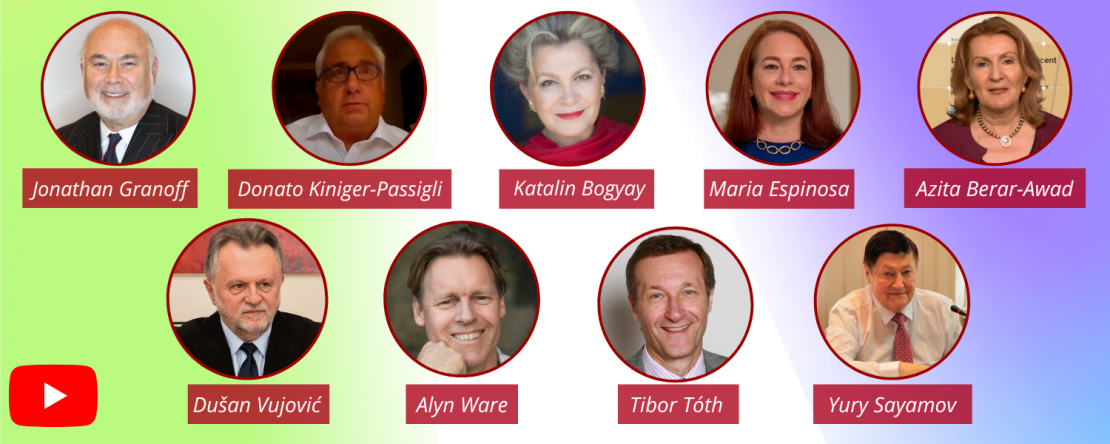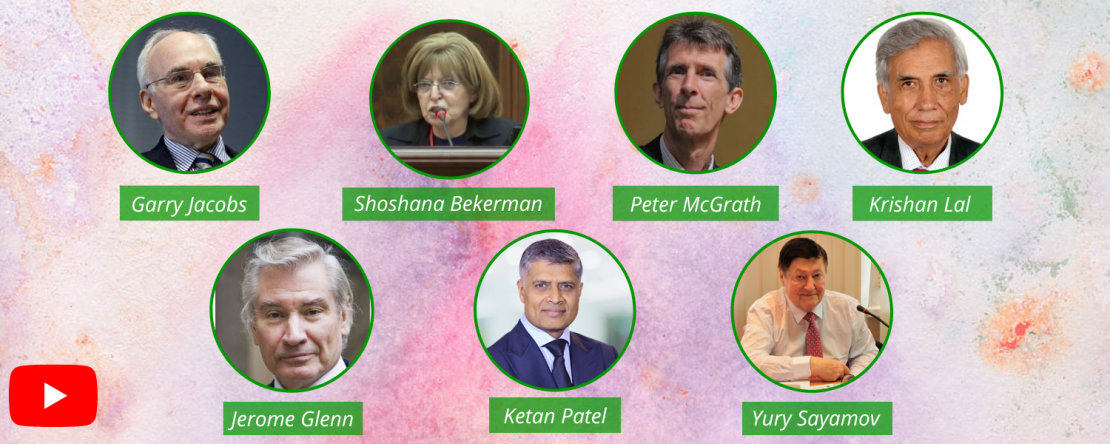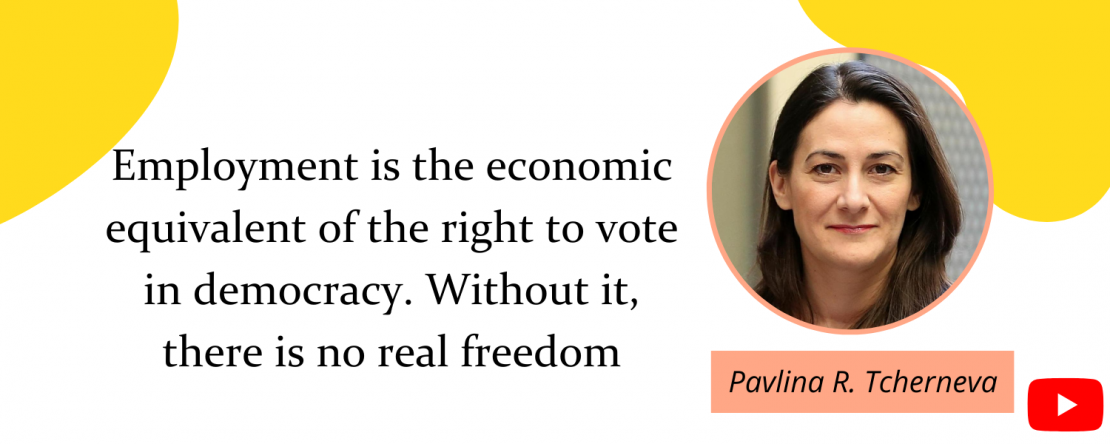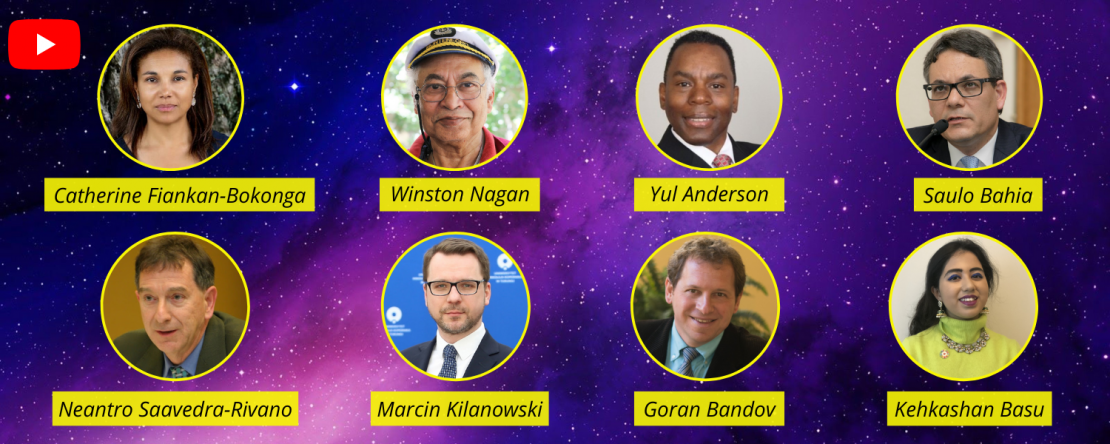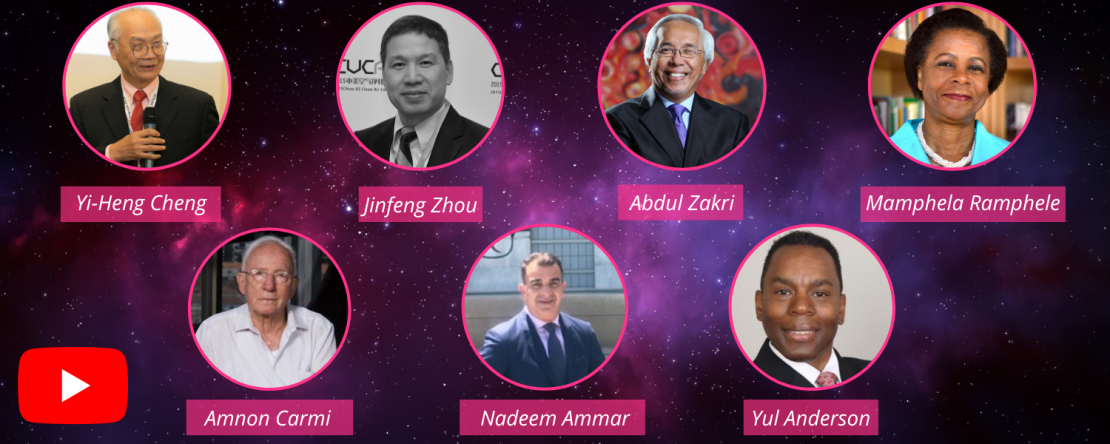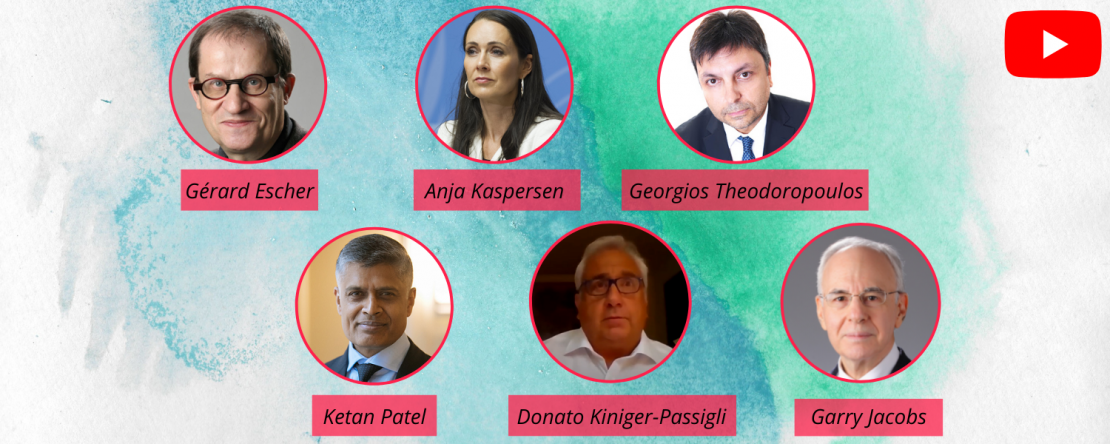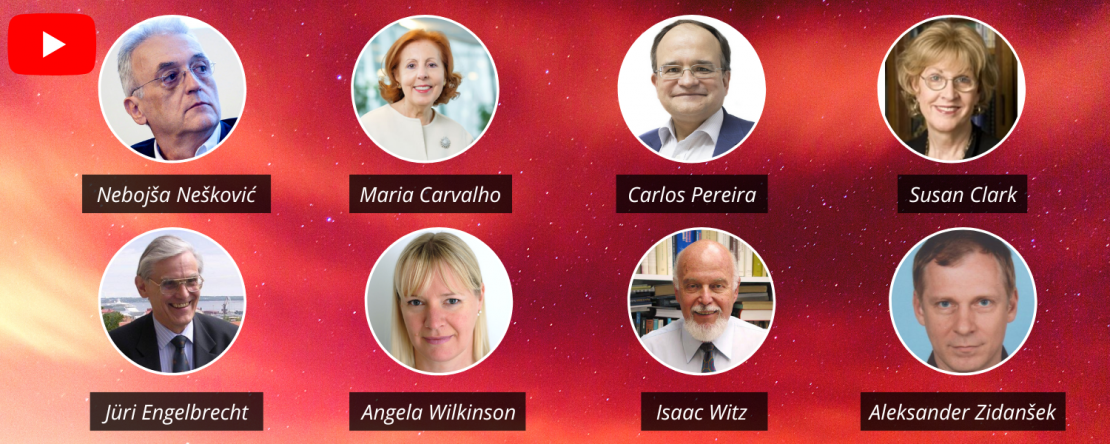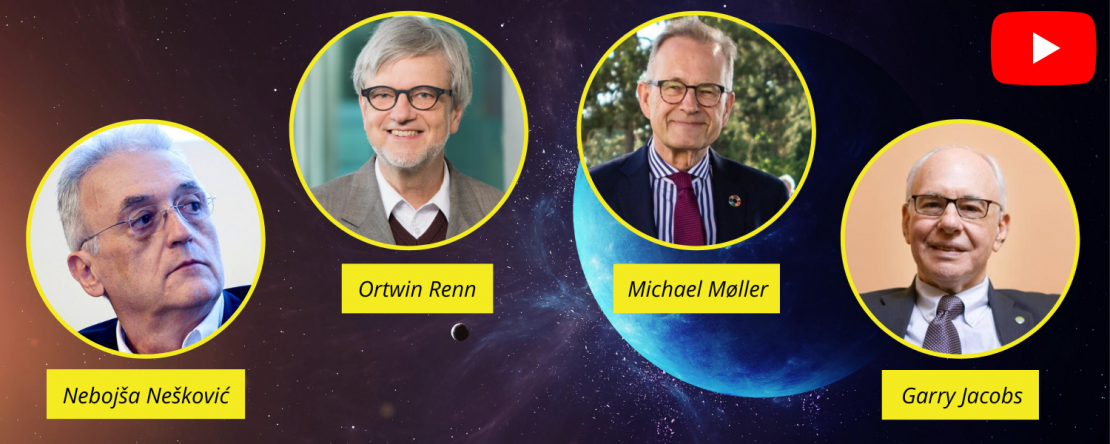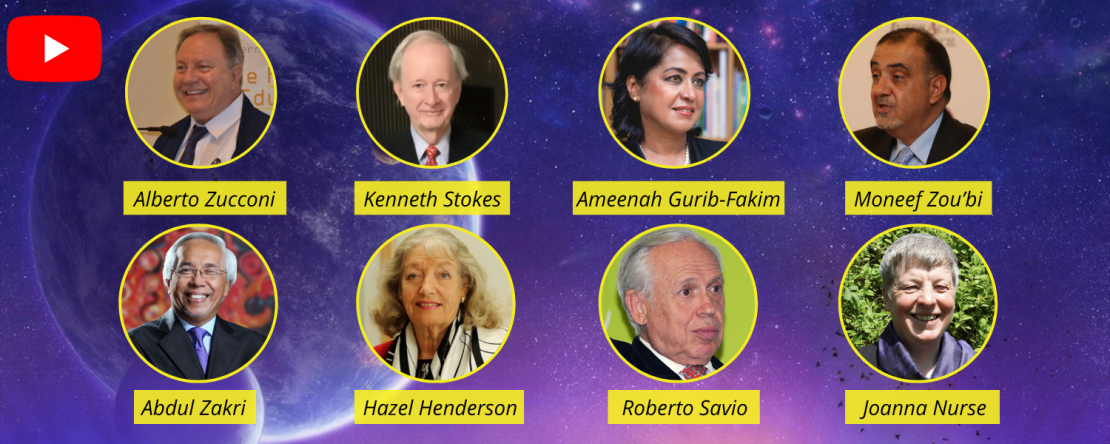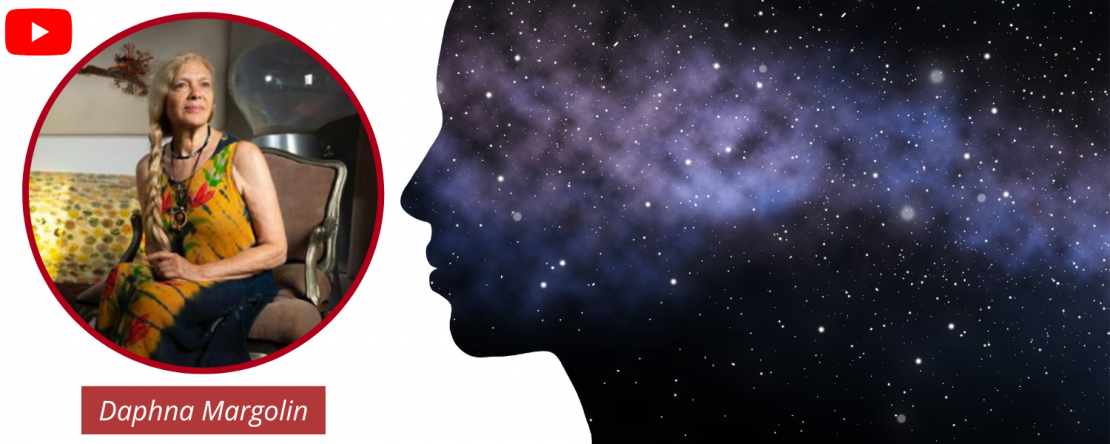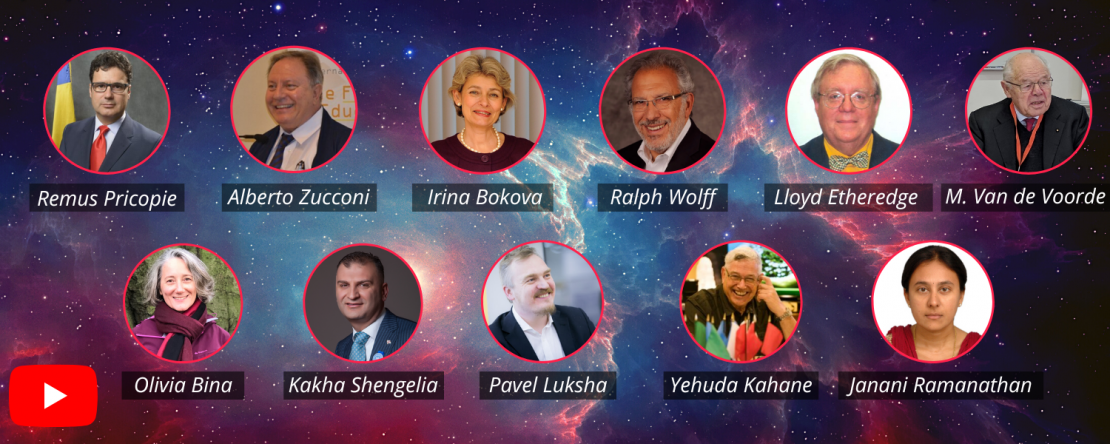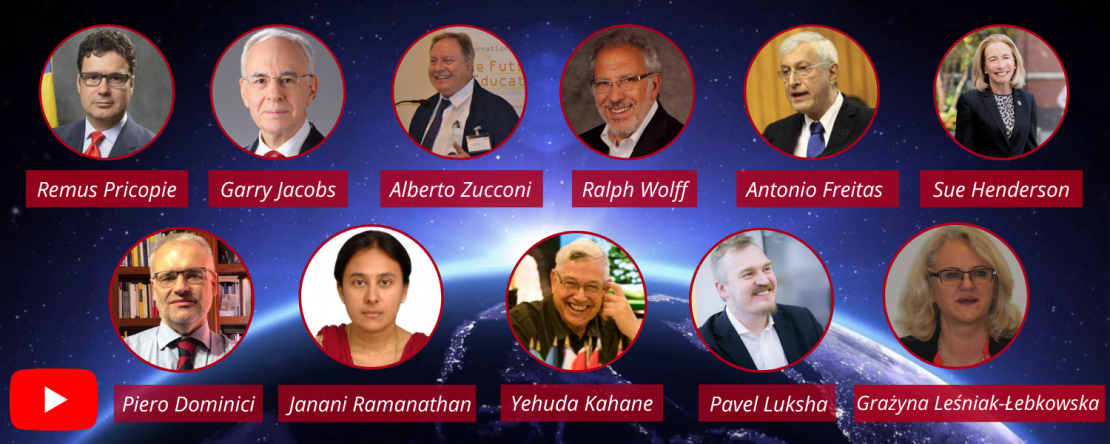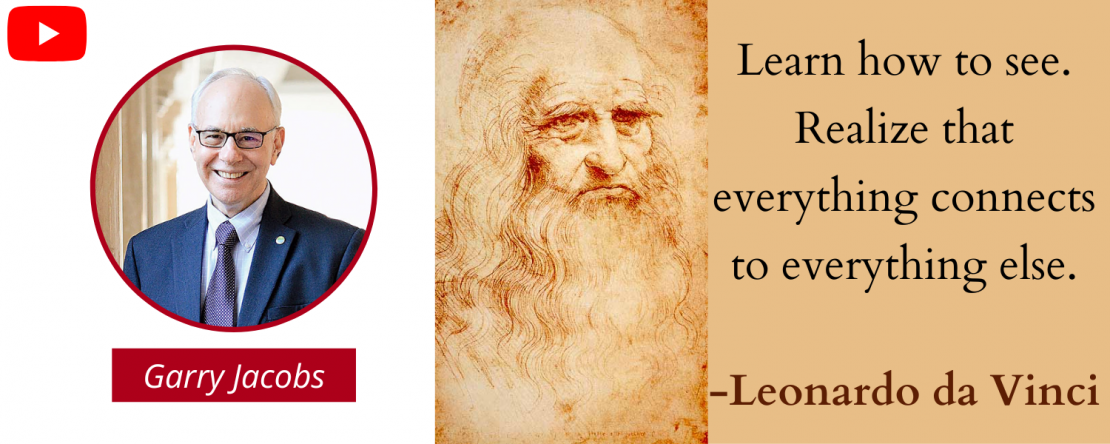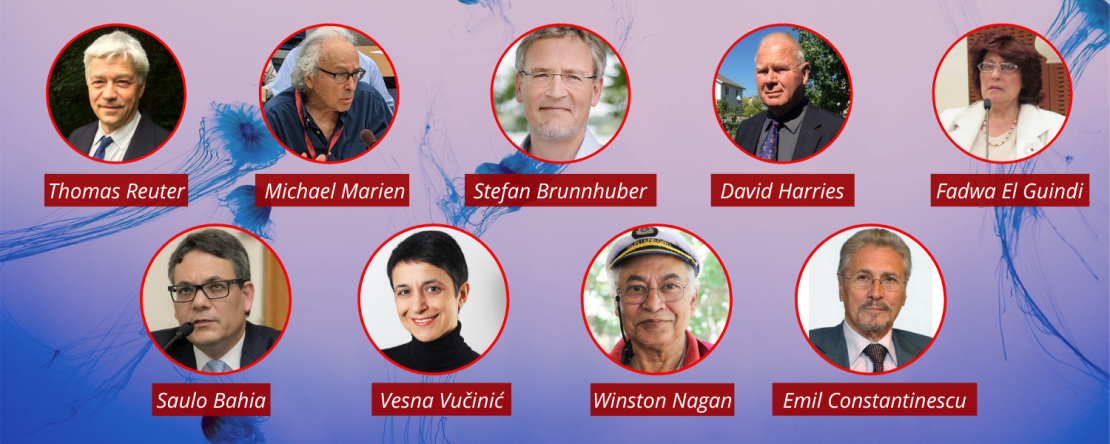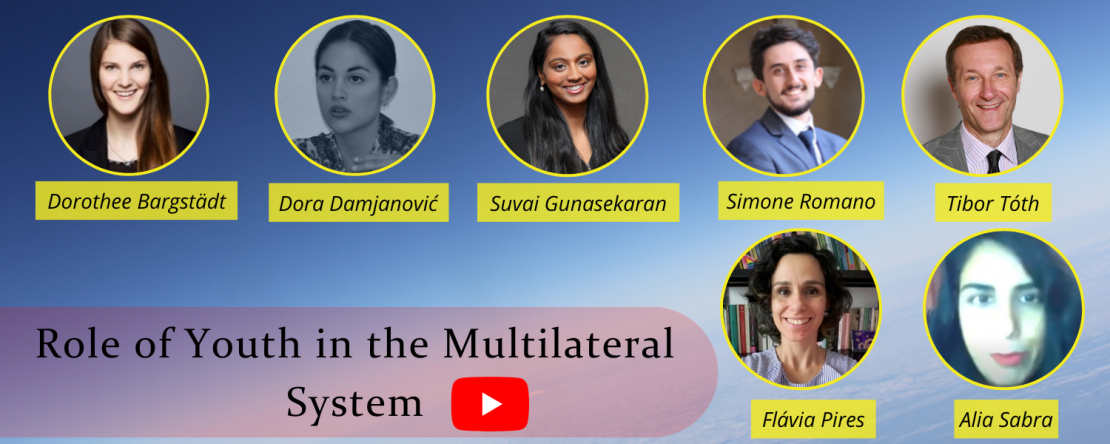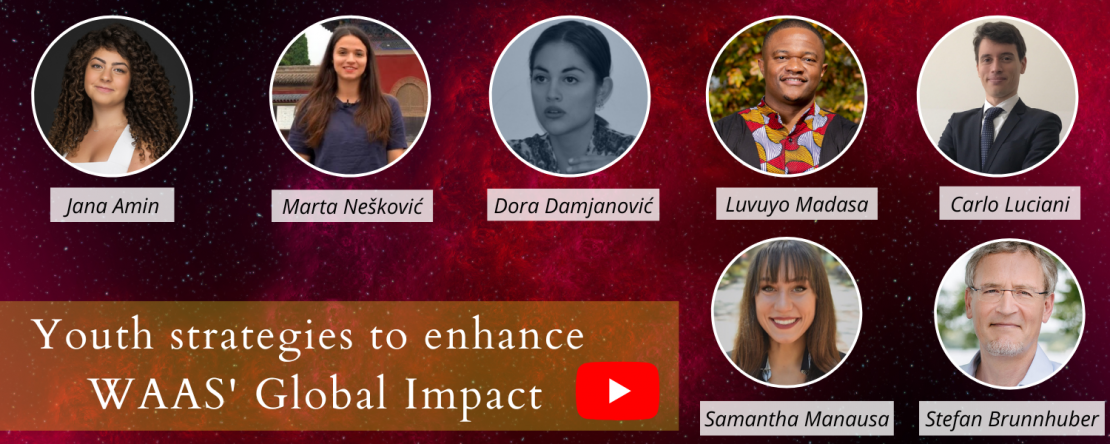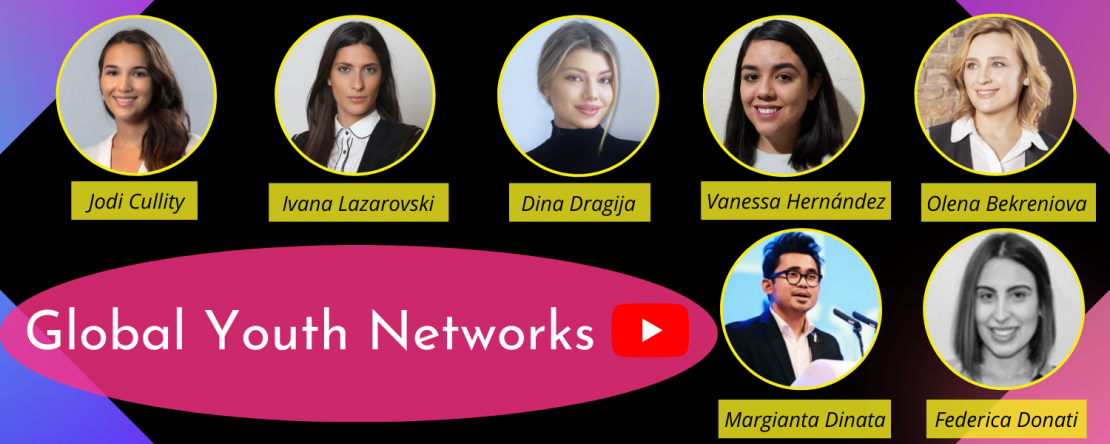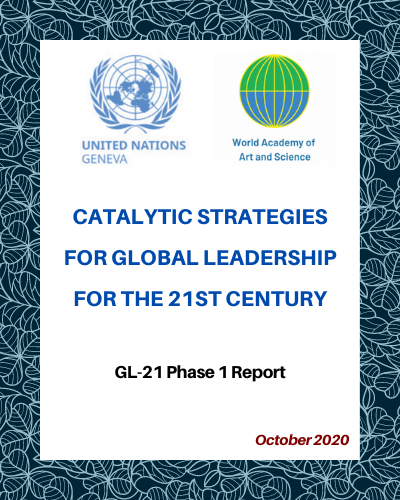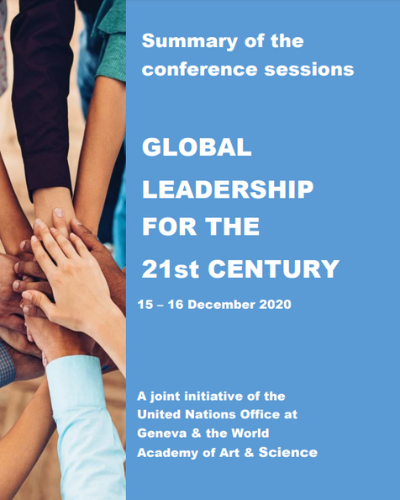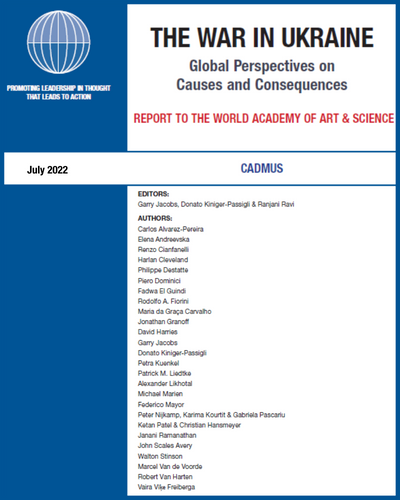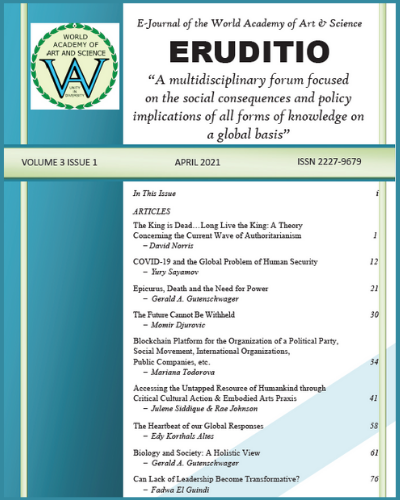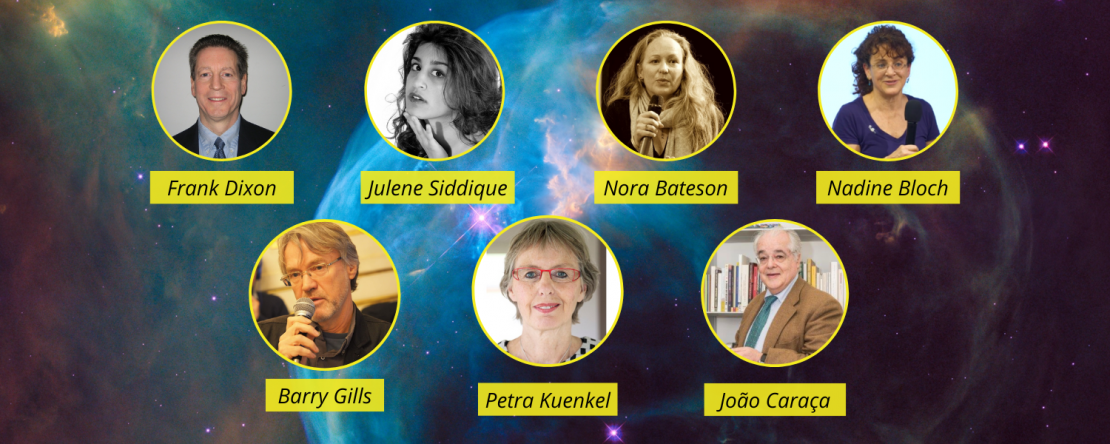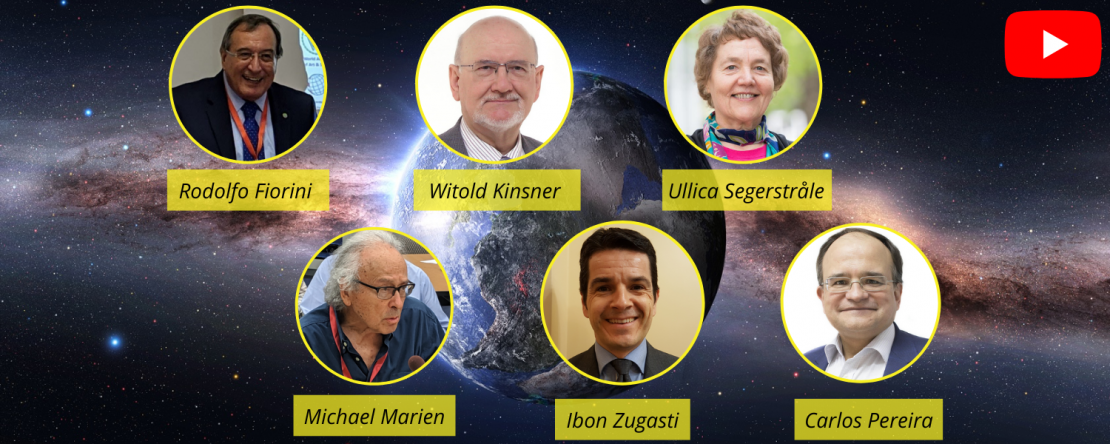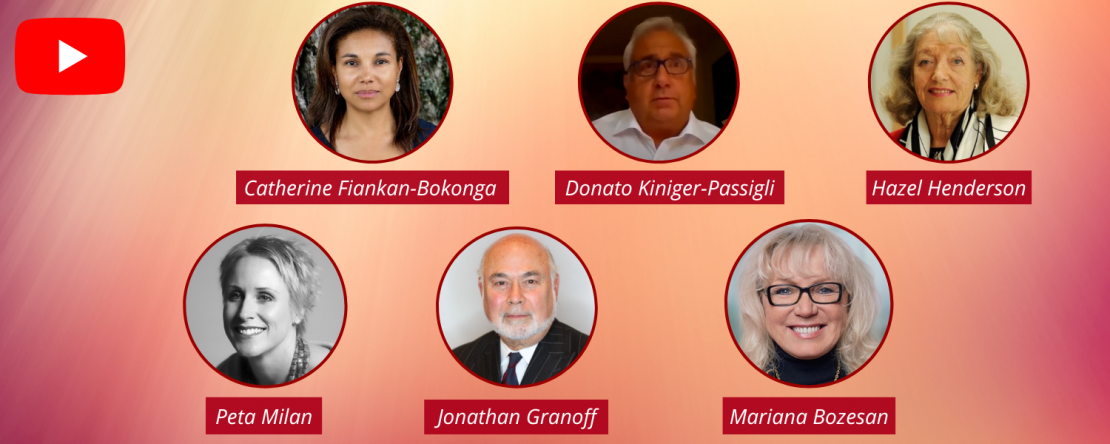Click here for PDF version
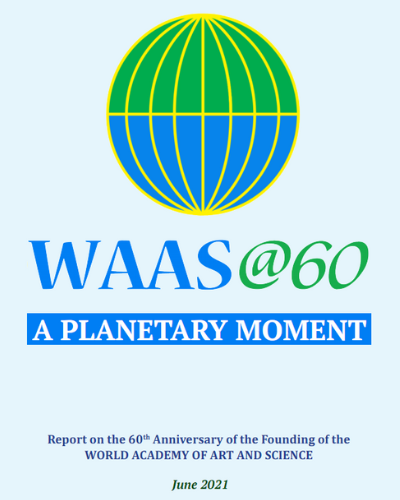
Contents
- EXECUTIVE SUMMARY
- FLASHBACK TO THE FUTURE
- GLOBAL GOVERNANCE
- HUMAN RIGHTS AND SECURITY
- SCIENCE, SOCIETY AND SUSTAINABILITY
- FUTURE EDUCATION
- GLOBAL SOCIETY
- LIST OF CONTRIBUTORS
EXECUTIVE SUMMARY
This report presents insights and conclusions of “WAAS@60—A Planetary Moment”, an e-conference held on February 15-19, 2021 marking the 60th anniversary of the founding of the World Academy of Art and Science. The report reflects on the unique mission, character and work of the Academy and explores innovative ways in which it can respond to current and emerging challenges.
As leading scientists and artists of the world envisioned in 1960, the Academy serves as a forum for leaders, scholars and thinkers to address the pressing challenges confronting humanity from a transnational, transdisciplinary perspective independent of political boundaries and prevailing orthodoxies. WAAS was founded on faith in the power of original and creative ideas—Real Ideas with effective power—to provide leadership in thought that leads to action. WAAS is a network of networks aspiring for a global movement of conscious social evolution.
WAAS was founded by eminent individuals deeply concerned with the social consequences and policy implications of knowledge. Born during the early days of the Cold War when the proliferation of nuclear weapons was in high gear, the Academy affirmed the social responsibility of science to concern itself with the application and consequences of its creations and discoveries. Since then it has examined both the enormous creative power and potentially destructive consequences of advances in science and technology in fields related to peace, human rights and human security. WAAS@60 examined critical issues pertaining to health and population growth, food and nutrition, economy and education, environment and climate, democracy and global governance, society and individual well-being, science and technology, information and media.
The title of the conference—“A Planetary Moment”—reflects the extraordinary circumstances under which the discussion took place. Recent times have been characterized by a steep decline of trust in social institutions, especially national governments and business, reduced support for multilateralism, a resurgence of bilateralism and unilateralism, a retreat from democracy and loss of confidence in the media. Only the scientific community has retained much of its standing, but it too is under continuous attack.
These trends have resulted in a global leadership vacuum just at the moment when enlightened leadership is most needed to address the unprecedented multidimensional challenges posed by the COVID-19 pandemic and the rapidly approaching existential threats of climate change.
Yet at the same time, recent events reveal unprecedented opportunities for global progress. The very magnitude and seriousness of current problems have created sufficient pressure to overcome or at least weaken the resistance posed by barriers to real change. During the past one year deeply-entrenched beliefs are being challenged and swept aside. Massive public investments in social welfare, employment and environment have thrust aside the long-standing neoliberal reliance on private sector investment and tax cuts. Prominent business leaders have renounced the goal of shareholder profit in favour of a more inclusive multi-stakeholder approach that recognizes the social responsibility of business. The world’s leading financial institutions are shifting their priorities away from unsustainable investments toward financing the SDGs. The automotive industry has announced radical changes that will dramatically accelerate its shift from petroleum-based vehicles to electric vehicles. Educational institutions are finally embracing the power of technology to provide high quality distance learning at a fraction of the cost of conventional classroom models with the potential to reach the tens of millions who lack access through the existing system.
WAAS@60 examined the significance of these shifts in public policy, sentiment and action. It has also sought ways to accelerate, magnify and support the transition to a new paradigm which shifts the focus from historically high levels of military spending to far greater investments in human security, and from social passivity to social activism to generate momentum for change. These and other initiatives form a significant part of the Academy’s evolving agenda of work to accelerate the process of global social transformation needed to promote human security for all.
Among the catalytic strategies discussed and under examination by WAAS are a global advocacy campaign for human security, central bank direct cryptocurrencies to finance the SDGs, a global platform to reflect the voices of “We the people”, ways to expand the role of civil society in the multilateral system, a new global delivery system for higher education, a paradigm shift in pedagogy, measures to address the cancer of fake news, global leadership education, global youth networks, new models for integration between science, policy, ethics, society and sustainability, and strategies for post-pandemic recovery.
The structure, membership and activities of the Academy encompass a very wide range of academic fields and occupational professions. The sessions in this conference transcend the barriers posed by disciplinary boundaries to examine issues from multidisciplinary and transdisciplinary perspectives. Thus, the discussion on the ongoing COVID-19 pandemic explores its impact on health, economy, employment, law, governance, social rights and equity. Discussion on the Sustainable Development Goals encompasses issues related to human security, human rights, economy, employment, governance, the multilateral system, business, civil society, and social movement.
Since its inception the Academy has been searching for more comprehensive and integrated ways to address the complex problems confronting humanity. At its founding it recognized the vital contributions of both science and art as complementary ways of understanding and reconciling the role of objective factors and subjective perceptions in human affairs. Both art and science are essential to human creativity. WAAS@60 has sought to include and synthesize both perspectives in its examination of global issues.
WAAS has been characterized by progressive ideas that have evolved over the years, alongside social development and emerging global trends. From its inception the Academy has been a transnational network of individuals bound together by shared understanding, vision, and values. The Academy’s leaders understood that human networks were the greatest power they possessed to effectuate change in the world. WAAS has grown in number, activities and reach through the decades and operates collaboratively with an extensive network of partner organizations. WAAS today is conscious of the collective power of human aspiration and values to ultimately accomplish what no single individual or organization can ever do. Sixty years after its birth, the Academy remains young, ambitious, hopeful—with the modesty and common sense to claim very little and the ambition to still aspire for very much.
CROSS-CUTTING THEMES OF WAAS@60
Power of Ideas
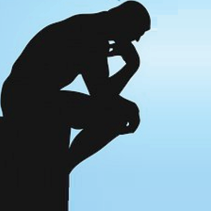
Synthesis of Art and Science
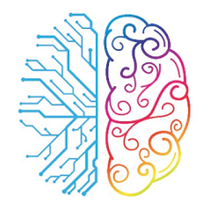
Reliable Knowledge
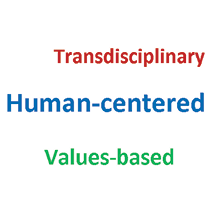
Responsible Science
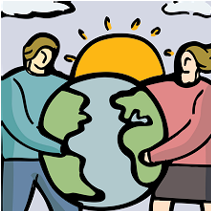
Integration
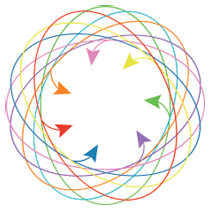
Values-Based Knowledge
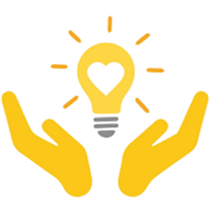
Power of Individuality
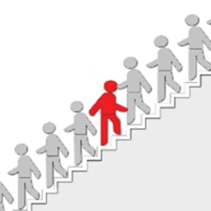
Human Security
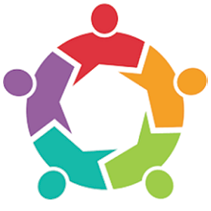
New Paradigm Thinking
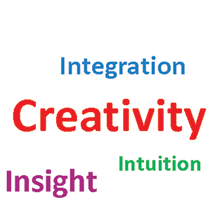
Network of Networks
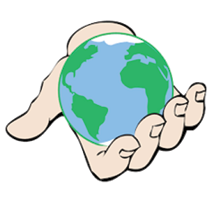
FLASHBACK TO THE FUTURE
WAAS: 60 YEARS IN RETROSPECT
WAAS was founded in 1960, but its origins date back to momentous events that shaped the course of world history in the 1940s and 50s, including the establishment of the Manhattan Project under the leadership of J. Robert Oppenheimer, the atomic bombing of Japan, the start of the Cold War, the division of Europe into rival military blocs, the invention of the H-Bomb and onset of the nuclear arms race, which ultimately led to the production of more than 125,000 nuclear weapons. These momentous external events sparked major changes in the minds and hearts of scientists, artists and other intellectuals concerned with humanity’s future as symbolized by the release of the Russell-Einstein Manifesto in 1955, warning of the catastrophic dangers of nuclear war with the heart-wrenching declarations:
“Renounce war or perish!, World peace or death! We appeal as human beings to human beings: Remember your humanity, and forget the rest.”
This video presents an impressionist perspective of global social evolution over the past 60 years. It traces the birth of the Academy up to the onset of the global pandemic. This artistic representation created by Raffaele Rossi reflects the increasing complexity of the modern world, but also reveals glimpses of hidden patterns, significant threads and driving forces of global social evolution.
The Academy was a child of the momentous events that followed the rapid advancement of science and the rising consciousness of human beings. The Manifesto led to the First International Conference on Science and Human Welfare in Washington DC in 1956, at which leading intellectuals discussed the future of humankind and recognized the social responsibility of science for the unfolding course of events.
“Its aim was to chart a peaceful course for global social progress toward a future in which all mankind will be able to enjoy the immense achievements of the human brain.”
The conference led directly to the formal establishment of WAAS on December 24, 1960 with the call
“Non-Scientists and Scientists alike! Let us all help to make this forum a true Agency for Human Welfare.”
The Academy was established with the explicit aim of marrying scientific knowledge with universal human values. It sought to become an independent, transnational, non-partisan group of eminent individuals concerned with the policy implications and social consequences of rapid advances in different fields of knowledge. Among its founders were J. Robert Oppenheimer and four of the eleven signatories of the Manifesto—Albert Einstein, Bertrand Russell, Joseph Rotblat and Hermann Muller. They also included five Nobel Laureates and distinguished international diplomats such as Joseph Needham, a co-founder of UNESCO; Lord Boyd Orr, the first Director-General of FAO; and G. Brock Chisholm, the first Director General of WHO.
During this period, untoward events continued to unfold dramatically, reinforcing the justification for their concern and the need for action. Two years later the Cuban Missile Crisis in October 1962 brought the world to the brink of nuclear war. This was also a period in which dramatic technological advances in transport and telecommunications brought the world closer together. In parallel with the invention of powerful weapons, science brought succor to humanity in the form of life-saving antibiotics and vaccines, such as the polio vaccine developed by WAAS Fellow Jonas Salk. One unanticipated outcome of falling death and infant mortality rates was the population explosion followed by growing threats of famine. Population growth and food production became issues of major concern to WAAS during its first decade.
It became increasingly clear that solutions to complex, wicked social problems require interdisciplinary, multidisciplinary and intersectoral knowledge of the interdependences between different fields of knowledge and social activity. They also require knowledge that transcends disciplinary boundaries and new ways of thinking and knowing that comprehend underlying transdisciplinary social processes. By the late 1960s, the Academy had already extended the scope of its work from peace, disarmament, population and food to even more challenging and more complex problems concerning the environment. The mission of the Academy has been to transcend conventional thinking and seek out new perspectives integrating science and art with ethics and universal values. WAAS was founded to study the impact of knowledge on policy and society, which means with relevance to human beings. Out of this effort has emerged a multidimensional conception of reliable knowledge based on a comprehensive and integrated transdisciplinary perspective applicable to social problems and opportunities in all fields.
Art has always been an integral part of the Academy. WAAS’ founders had great faith in science. But they also realized that science alone is not enough to ensure human welfare. The knowledge required must encompass the whole “art of living”. In addition to the objective knowledge obtained by analysis of hard facts generated by observation of the external world, it also requires subjective knowledge derived from the highest universal values. All human knowledge is a social construction of reality. Its efficacy depends on the values on which it is based and which it seeks to realize.
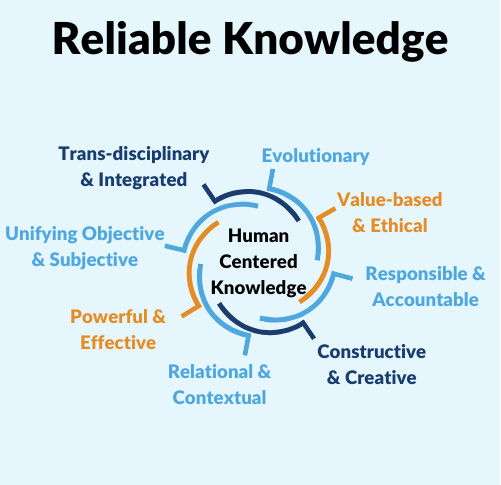
WAAS TODAY
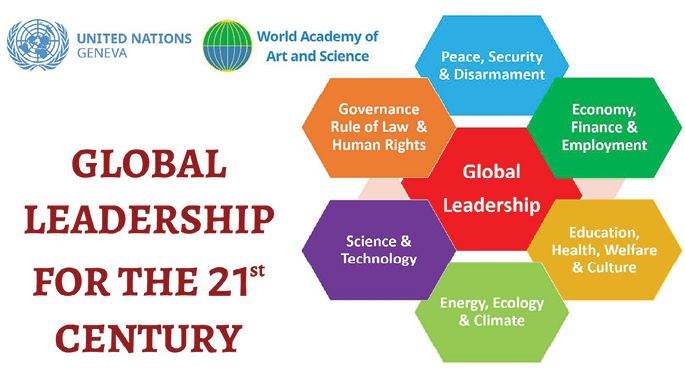 The world is under the stress of rapid technological, economic, social and cultural evolution. This stress has created deep fissures in the existing system and institutions of global governance. Confidence in governments, business and the media is historically low. Only science retains high levels of public trust and confidence. The growing conflict between progressive elements and regressive forces is disrupting social cohesion, undermining confidence in the multilateral system of international relations, sowing seeds of discord in society and spurring a retreat from democracy. The zigzag patterns of advance and retreat, affirmation and denial challenge conventional theories and conceal deeper lines of social evolution advancing beneath the surface turmoil. Traditional concepts and forms of leadership are inadequate to cope with the challenges confronting humanity today. Innovative approaches are needed to fill the leadership vacuum. The Global Leadership for the 21st Century project initiated by WAAS in collaboration with the United Nations Office at Geneva is studying the deep-seated processes that are driving global social evolution. It is examining critical issues related to peace, health, food security, economic inequality, employment, finance, environment and climate change. It is seeking ways to define a more inclusive multilateral system and to identify catalytic strategies to accelerate global social progress. WAAS programs are focusing on the process of rapid social transformation and exploring innovative strategies to create a voice for global humanity, new models for coordinating scientific research and policy-making with social equity and implementation, new pedagogy and delivery systems for global education, new approaches for private and public sector financing of the SDGs, including the introduction of central bank digital currencies and measures to realign private sector investment with global social objectives, and strategies to enhance the credibility of the media, harmonize global cultural integration and enrich cultural diversity.
The world is under the stress of rapid technological, economic, social and cultural evolution. This stress has created deep fissures in the existing system and institutions of global governance. Confidence in governments, business and the media is historically low. Only science retains high levels of public trust and confidence. The growing conflict between progressive elements and regressive forces is disrupting social cohesion, undermining confidence in the multilateral system of international relations, sowing seeds of discord in society and spurring a retreat from democracy. The zigzag patterns of advance and retreat, affirmation and denial challenge conventional theories and conceal deeper lines of social evolution advancing beneath the surface turmoil. Traditional concepts and forms of leadership are inadequate to cope with the challenges confronting humanity today. Innovative approaches are needed to fill the leadership vacuum. The Global Leadership for the 21st Century project initiated by WAAS in collaboration with the United Nations Office at Geneva is studying the deep-seated processes that are driving global social evolution. It is examining critical issues related to peace, health, food security, economic inequality, employment, finance, environment and climate change. It is seeking ways to define a more inclusive multilateral system and to identify catalytic strategies to accelerate global social progress. WAAS programs are focusing on the process of rapid social transformation and exploring innovative strategies to create a voice for global humanity, new models for coordinating scientific research and policy-making with social equity and implementation, new pedagogy and delivery systems for global education, new approaches for private and public sector financing of the SDGs, including the introduction of central bank digital currencies and measures to realign private sector investment with global social objectives, and strategies to enhance the credibility of the media, harmonize global cultural integration and enrich cultural diversity.
INVENTING THE FUTURE
We are in the midst of one of the most profound transitions in history. There is an urgent need for new ways of thinking that generate new types of solutions to the problems threatening humanity’s survival and impeding its further progress. The future lies in integrated transdisciplinary perspectives. Realization of the SDGs will only be possible when we fully realize the extent of the linkages and interdependences between them and evolve a holistic concept that closely coordinates and integrates action on them all as dimensions of the overriding objective—Human Security.
The COVID-19 pandemic highlights the importance of a comprehensive and integrated approach to Human Security that encompasses all aspects of human welfare. Conventional ideas about competitive national security are increasingly irrelevant. The threats confronting humanity today are no longer confined to some sectors and parts of the world. They are increasingly multidimensional and global in nature and can only be effectively addressed by cooperative global action.
Human Security is a concept that includes peace, economic welfare, social cohesion, cultural harmony, ecological balance, human rights, equity, and sustainable development. Effective security solutions cannot be arrived at by national governments or multilateral institutions alone. They must arise from an unprecedented effort at multilateral collaboration, intergenerational dialogues, multidisciplinary perspectives and multistakeholder partnerships based on mutual trust in one another and in our social institutions.
The COVID-19 pandemic may subside within a year or two but the lessons to be learned from it will be of increasing relevance in coming years. Competitive security and national sovereignty are no longer viable principles on which to found global governance and human wellbeing. The pandemic has exposed all the flaws in a fragmented global social system which fails to effectively utilize humanity’s immense knowledge, organizational capabilities, technological know-how and material resources for the betterment of all humanity.
WAAS’ future programming is examining opportunities in a wide range of fields including:
- Inclusive Multilateralism: To enhance the participation and contribution of civil society organizations and other stakeholder groups in the multilateral system.
- Human Security: To promote the application of an integrated approach to human security as a comprehensive, inclusive framework which places the welfare and wellbeing of human beings at the center, and shifts focus from competitive national security to all-inclusive human security.
- Learning from the Pandemic: To examine the COVID-19 pandemic holistically from multiple perspectives and draw lessons to improve multilateral coordination and inform a more balanced policy and public debate which will enhance our ability to cope with future crises of a systemic nature.
- Integration of Science, Policy and Ethics for Society and Sustainability: To promote the study of the connections between science, social responsibility, and the evolution of the relationship between science and society. Initiate partnerships with scientific institutes working to translate cutting-edge science into concrete actions for social welfare and human wellbeing.
- Voice for Humanity: To promote the development of a virtual platform to give a direct voice to “We the People”.
- Science and Sustainability: To strengthen the linkages between the natural sciences and public policies and practices for promoting sustainability in all fields.
- Global Leadership Education: To develop courses on leadership based on the GL-21 program to equip individuals in all fields to better understand, navigate and effectively act in this rapidly evolving, increasingly complex global society.
- Future Education: To promote more accessible, relevant and effective higher education based on a new pedagogy and global delivery systems, and with a transdisciplinary, human-centered approach.
- Social Responsibility of the Media & the Future of Information: To promote strategies to evaluate the objectivity, neutrality and reliability of information from major news services and provide recognition to institutions with the highest standards.
- Social Transformation: To examine historical and recent social achievements to identify strategies to transform the long, slow process of social evolution into a conscious process of social transformation.
- Inter-generational Networks: To foster the development of networks that foster more effective exchange of knowledge and experience between generations to enhance learning on all sides.
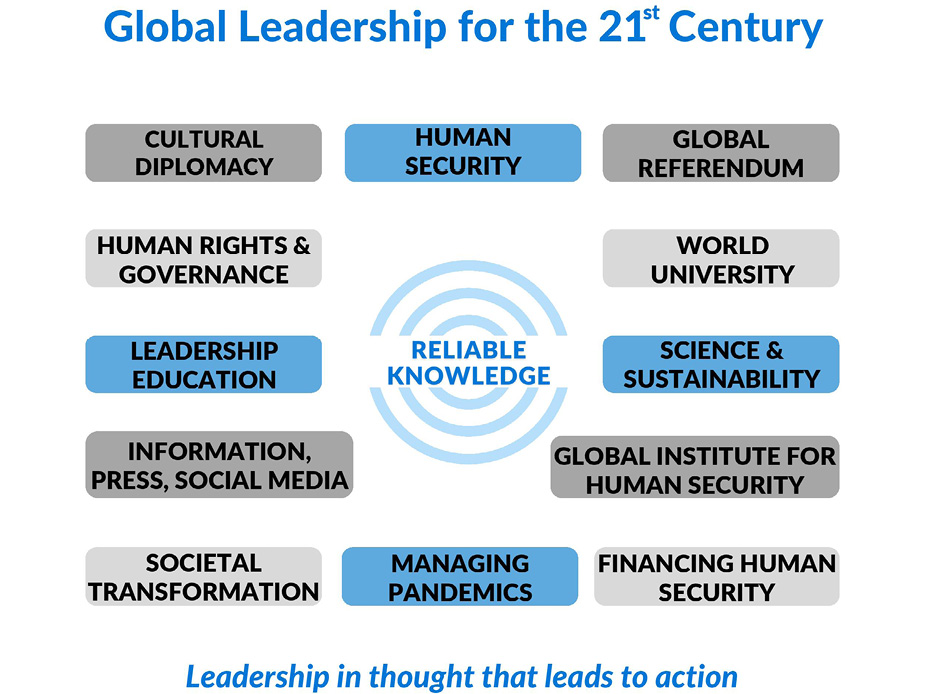
ART AND SCIENCE
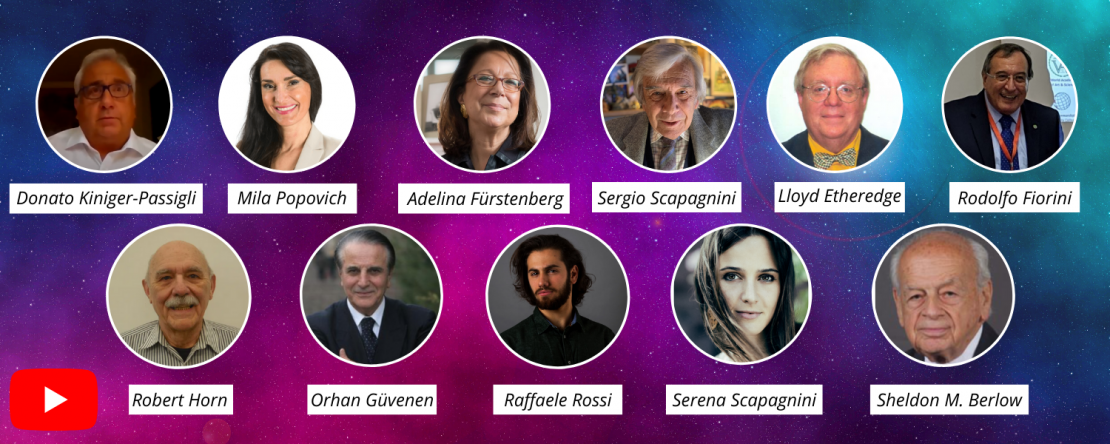
WAAS was founded as a transnational, trans-disciplinary academy of art and science in order to integrate the objective perspectives of science with the subjective insights drawn from the arts. Art and Science are not two separate and incommunicable worlds, but two complementary branches of the same tree that can converse and converge with one another to generate continually evolving knowledge that is greater than the sum of its parts. Art and Science were perfectly integrated by geniuses such as Leonardo da Vinci, who was a master of both universes. Scientific knowledge, as Einstein said, has a very precise contour and dimension, while artistic imagination and creativity are boundless. Science without Art is unimaginative and mechanistic. Art, through a scientific approach, transforms abstract knowledge into concrete applications.
There is no dichotomy between these two branches. Creativity in science and art are closely related processes. Serious efforts are needed to accelerate the integration of these two branches of knowledge in education and in various forms of knowledge discovery and expression. Our complex and interconnected global problems necessitate an interdisciplinary approach by which leading thinkers across disciplines share ideas and insights. WAAS is a melting pot of experts from diverse fields and offers a platform where they can collaborate to come up with holistic and sustainable solutions. Founded as an Academy of both Art and Science, WAAS can play an important role in furthering this effort of integration.
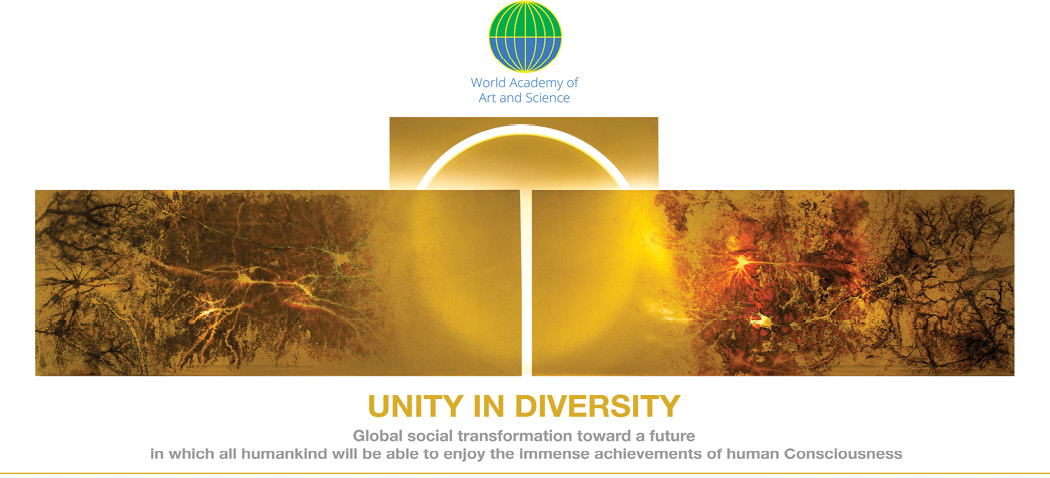
GLOBAL GOVERNANCE
ROLE OF CIVIL SOCIETY IN THE MULTILATERAL SYSTEM
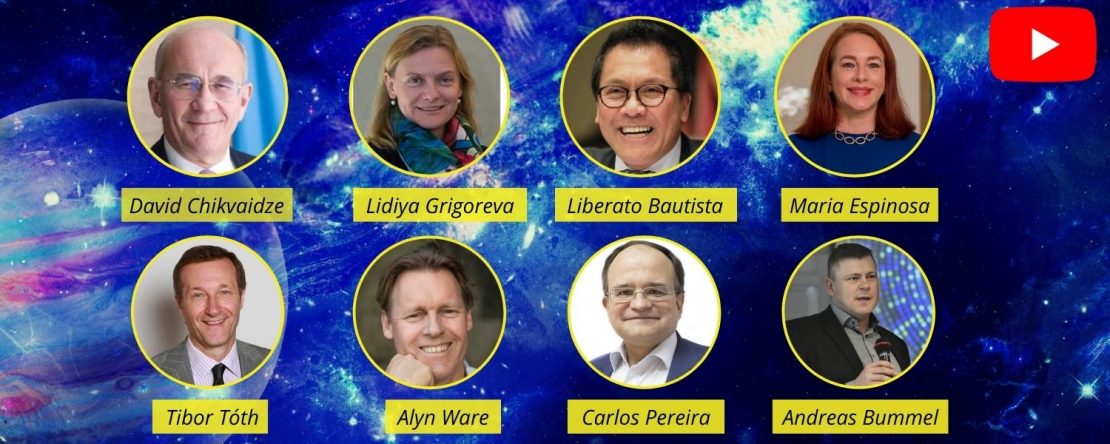
Civil society plays a critical role in driving social change. The UN system and other multilateral institutions rely on civil society and derive much of their legitimacy from engaging meaningfully with these organizations. There is no declaration, convention, treaty, or UN resolution that does not have a significant civil society input. WAAS has launched an initiative under the UNOG-WAAS Global Leadership Project to explore ways in which the multilateral system can be strengthened to enhance the participation and contribution of Civil Society Organizations (CSOs) for addressing global challenges and developing global opportunities. Multilateral diplomacy is the only option for humanity to address and solve global challenges. A new culture of multilateralism is needed that is inclusive, networked, accountable, and responds to the needs of people and the planet. People should no longer be seen only as shareholders and
stakeholders but also as rights-holders. Civil society is a key contributor to strengthen and re-energize the multilateral system. It is a force multiplier. There are several ways in which CSOs can engage with multilateral institutions: engagement with government representatives who have the voting power in the UN, through associations of parliamentarians such as the Inter-Parliamentary Union, and by direct participation in UN meetings. One of the obstacles to such engagement is the lack of awareness of such opportunities. This can be remedied through education, awareness programs and media initiatives. CSOs should become more agile and innovative in entering the spheres of member states, and flood the system in a positive way with ideas, initiatives and expertise. The realization that the fate of each of us relies on the fate of all of us can help forward the agenda for renewed multilateralism and a greater role for civil society.

LEADERSHIP FOR PLANETARY MOMENTUM
Global society today confronts challenges of unprecedented magnitude. Humanity’s task is to harness the energy generated by the crisis to transform these challenges into global social momentum for positive change.
The multidimensional challenges posed by the global pandemic are already generating that energy and momentum.
Climate change poses even greater, more complex challenges of existential proportions but they are not yet tangibly felt by the vast majority of human beings to release sufficient energy and momentum for effectively addressing it.
The SDGs have given us clear and precise goals and targets for addressing critical issues such as poverty, hunger, health, water, climate, pollution, employment, education, social equity, peace, and human rights, etc. But these goals and ideals remain a set of independent goals and initiatives without acquiring the concentrated mass and momentum necessary to sufficiently motivate the world to concerted action. Fragmented thinking, piecemeal policy-making, and compartmentalized institutional structures impede effective implementation. Greater understanding and awareness of the gaps between goals and effective action are needed to convert this diverse array of critical social objectives into an integrated global social movement for human security.
The world possesses the knowledge needed to tackle these global challenges. We have the means to generate the finance necessary. The will to move forward too is there. We need a strategy to convert the pressure of problems into positive momentum on precise pathways for transformation.

The world requires roughly $4-5 trillion annually for the implementation of the SDGs. Innovative public financial strategies by central banks combined with revision of private investment strategies by leading banks can generate all the funds needed for the transition from fossil fuels to renewable energy, chemical-intensive agriculture to sustainable agriculture, food scarcity to universal food security.
Youth, with their tremendous positive energy, represent an enormous untapped resource. They must be given an active and important part in global society’s decision-making and implementation processes.
DEMOCRATIZING GLOBAL GOVERNANCE
The common factor in all the biggest challenges facing humanity is their global and cross-cutting nature. Greater and more effective international collaboration and global governance are critical to solving them. The message from the UN75 Survey is clear—while the UN has undoubtedly made the world a better place, it needs to be retooled to be able to respond to a completely new world scenario. A majority of 1.5 million respondents to the survey believe that we need a more inclusive UN system that gives greater voice to non-state stakeholders, especially civil society.
The global conversations around the future of the UN have elicited hundreds of proposals from think tanks, academia and civil society organizations, that revolve around the question: How can we make the UN credible, relevant and accountable to all? Among the many proposals are three innovative strategies presented by Democracy Without Borders to provide a greater voice and formal representation of civil society in the UN system.
1. World Citizens’ Initiative: This proposal would enable people around the world to put forward proposals on key issues of global concern for discussion and further action at the highest political level. The Initiative would be a formal UN instrument for citizen participation and consultation, similar to the European Citizens’ Initiative. Citizens would be able to register their own proposals, and those proposals that get over five million signatures would be put on the agenda for consideration by either the UN General Assembly or the UN Security Council.
2. UN Parliamentary Assembly: This proposal first put forth more than 70 years ago allows for the inclusion of elected representatives of the citizenry from each nation to participate in the agenda-setting and decision-making of the UN. The Assembly will act as a representative body connecting the people with the UN and reflecting a broad diversity of viewpoints. Each nation would have the option to elect representatives from among parliamentarians or directly from the general public. A key feature of the assembly would be that delegates group according to their political views and not according to the country of origin or geopolitical background.
3. UN Civil Society Envoy: This proposal would enable greater participation, spur inclusive convenings and drive the UN’s outreach to public and civil society organisations. It would champion the implementation of a broader strategy for opening up the UN to people’s participation. It would perform an assessment of best practices, inconsistencies that exist and roadblocks with a view of improving standards and simplifying processes.
The Academy is examining a variety of challenges posed to the implementation of these proposals. With the necessary political will, civil society activism and technology, means can be identified to overcome the challenges. If implemented, these proposals would help spark a transformation of the UN, and bridge the trust deficit in political institutions and international law.
GLOBAL REFERENDUM: VOICE FOR HUMANITY
Concerted action is urgently needed to strengthen the multilateral system, promote worldwide cooperation between nation-states, and address the full spectrum of human security issues posed by the COVID-19 pandemic, accelerate implementation of the SDGs, and act expeditiously to avoid the existential threats posed by climate change. Generating support for global action on this massive scale is unlikely unless a shared sense of identity emerges among all the peoples of the world. Humanity needs a voice—a mirror in which to reflect its collective shared aspirations. Today only the governments of nation-states have a voice. The world’s citizens have only a faint and indirect influence over decisions taken on their behalf in national capitals and international organizations.
The digital technologies available today provide a possibility for the views of people to be heard on a global scale instead of just through indirect representation. The objective is to achieve the broadest possible consensus by establishing a platform accessible to all who have mobile phone access. The platform could be an instrument for conducting formal or informal global polls and non-binding referendums which could foster the emergence of a shared global social consciousness.
WAAS is in the process of evaluating answers to critically important questions regarding the platform:
- What is the central objective of the project?
- Who is the target audience?
- Who are the potential partners for this initiative?
- How will they be represented and how will decisions be made?
- How will they be organized?
- How will the project be financed?
- What features of polling and voting should it include?
- How will digital security be achieved?

Any new digital platform should be fit for competition in the attention economy by using state-of-the-art technology and should be a real alternative to privately-owned commercial platforms. DG Agora has developed a blockchain-based platform technology which allows for a delegation of votes in the sense of liquid democracy. It is now available and has been offered to the project on an actual cost basis. WAAS seeks to identify like-minded organizations to collaborate.
ROLE OF ACADEMIES IN THE MULTILATERAL SYSTEM
Declining trust in politics combined with consistently high levels of trust in scientists and researchers ascribes to Academia an increasing role in policy-making and implementation based on interdisciplinary research.
The interconnected nature of global challenges requires evolution toward coherent, integrated knowledge systems. The implementation of the SDGs demands global interchanges of interdisciplinary knowledge through global platforms for science and technology, more equally distributed scientific capacities, and related infrastructures.
Improved global cooperation could have prevented the ongoing unequal distribution of COVID vaccines—collective, coordinated action by the Academies can increase the effectiveness of research and implementation.
Prevailing networks of Academies concentrate on national and regional Academies, which have limited access to political decision-making. Extending their research toward interdisciplinarity and implementation will enhance cooperation with all stakeholders. Mission-oriented and human-centered cooperation with business, politics, NGOs, youth, etc., can contribute to local, national, and global solutions.
More evidence-based political and public understanding of science will facilitate the management of growing complexities and increase the trust of the people. Effective integration of Academies into the multilateral system needs an accelerated evolution of existing bottom-up elements of a global scientific system with top-down support from the UN.
The Intergovernmental Panel on Climate Change (IPCC) has developed through its high scientific expertise to become a global authority linked to the UN. IPCC is a striking example of the successful integration of the global scientific system into the multilateral system.
WAAS calls for developing a more inclusive multilateral system which more effectively includes and engages science academies and research institutes as collaborating partners in its activities.

HUMAN RIGHTS AND SECURITY
PEACE AND HUMAN SECURITY
Human security is an integrated, organic conception of life, centered on human beings and founded on the centrality of universal values. It recognizes and addresses the complexity of people and their aspirations to be free from want, fear and indignity. It is based on the recognition of interdependence between all dimensions of security—food, health, economic, political, personal, community, and environmental. Human security must be understood as a framework for action.
Trust is the most important quality in any discourse about human security. Building trust and understanding between people, cultures and nations is essential.
The state and the corporation operate on mythical premises of security. The state focuses on competitive nationalism and military security. The corporation externalizes the natural world and works for indiscriminate, perpetual growth. But we see that all the nuclear weapons in the world could not stop the spread of the COVID-19 virus or address its implications on public health or the economy. The same is true for the existential threat of climate change. If anything, the $1.9 trillion invested in military security every year has accelerated and worsened the climate crisis.
The general conditions for peace and security are defined negatively. Peace is conceived as the absence of war and security as the ability to attack or retaliate. We need a positive conception of peace.
We must also re-examine the basics of economics and the traditional concepts of employment. Maximizing profit can no longer be at the cost of the environment and equality. Futures thinking and effective intergenerational engagement need to be part of our planning.
There have been several missed opportunities for promoting human security. We must seize the opportunity the pandemic has given us to rethink the paradigm of human security.
The close interlinkage and interdependency among the SDGs make it essential to adopt an inclusive, integrated human security framework for implementation. That will require significant changes in the relationship between fields of research, institutional relations and the formulation of public policies.

GLOBAL INSTITUTE FOR HUMAN SECURITY
Implementation of an integrated approach to human security requires a revamping of prevailing institutional models for research, policy-making, implementation and coordination between public agencies and communities. The compartmentalization of scientific disciplines results in fragmented understanding, piecemeal policy formulation and uncoordinated implementation.
New models are needed to close the horizontal gaps between disciplines and the vertical gaps between knowledge generators, policy-makers and implementing agencies.
The interactions and interdependencies between the different sectors—political, economic, social, cultural, ecological, and technological—result in a complex social reality in which all dimensions of security are interrelated and interdependent.
WAAS is fostering an integrated framework and model which is multidisciplinary, multi-sectoral, multi-stakeholder and global, and spans the full gamut of activities across disciplines from conception through implementation to promote human security for all. Several existing institutions share certain characteristics of the model under consideration.
InterAcademy Partnership (IAP) is a global network of science academies that synthesizes knowledge from different sciences for practical application to address social challenges. It pre-emptively scans the horizon with its academies, identifies emerging issues, and positions its work in such a way as to make the maximum positive impact.
Inter-Parliamentary Coalition for Global Ethics (IPCGE) brings together world policy-makers to commit to and implement the universal values of global ethics for a culture of peace, environmental protection, social justice, and international legislation in alliance with educational, religious, and non-governmental organizations.
Two new models which capture more dimensions of an integrated approach are the Geneva Science and Diplomacy Anticipator (GESDA) and Science Advice for Policy by European Academies (SAPEA), which are discussed elsewhere in this report.
WAAS is exploring ways in which it can promote a new institutional design for research and implementation with its partners, which
- encompasses all sectors, stakeholders, levels from global to local, and all dimensions of human security;
- bridges the gaps between disciplines, specialized institutions, piecemeal policies;
- and also closes the gaps separating research and policy-making from practical implementation.
FINANCING THE FUTURE
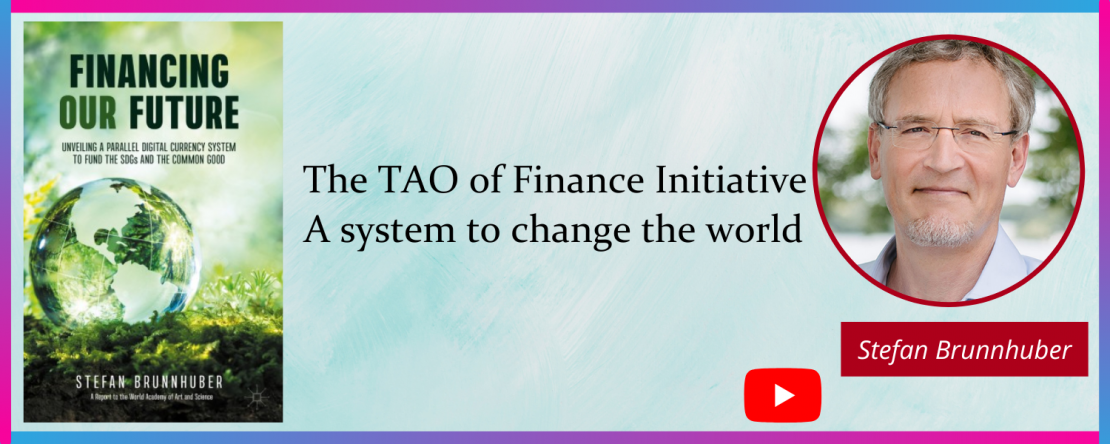
Development needs have primarily been financed through private sector financing, conventional public sector funding and philanthropic commitment. These sources are not sufficient in scale and speed to meet the pressing finance needs. Two-thirds of the investment needed to finance the SDGs relate to the global commons, which cannot be met by private finance. The current financial system is also unstable, erratic and subject to sharp fluctuations.
A complementary system is needed. The introduction of a parallel electronic currency specifically designed to finance global commons and a human-centered economy can provide the necessary resources to achieve the UN SDGs while stabilizing the existing monetary system. The Academy’s project on Financing Our Future examines the feasibility of introducing such a mechanism for sustainable financing of our common future and in particular, the SDGs.
The introduction of a parallel electronic currency can be achieved by giving Central Banks a modified monetary mandate to inject new liquidity into the system (top-down), or through corporate or communal initiatives (bottom-up). By issuing a blockchain-enabled parallel electronic currency earmarked for SDG-related projects and using channels for monetary flow other than the conventional system, our future could be financed in a different manner. Smart contracts made possible by blockchain enable investments to be targeted to specific applications without diversion for speculation, corruption or other uses.
Letting go of our current monetary monoculture would in the long run stabilize international financial markets, increase monetary regulatory efforts, reduce negative externalities, increase social pareto-optimum and stabilize democracies. The approach is explained in the Financing Our Future: Report to the World Academy of Art & Science, authored by Stefan Brunnhuber, Program Director of the WAAS Expert Group on Innovative Financial Strategies.
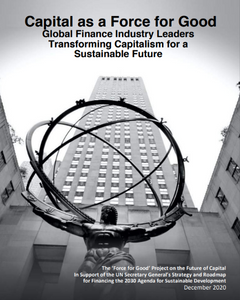
REPRIORITIZING PRIVATE INVESTMENT
Private finance is playing a growing role in funding the SDGs and climate management. The report Capital as a Force for Good is based on an in-depth study in collaboration with 30 leading global financial institutions. It documents how these institutions are transforming capitalism for a more sustainable future. The study finds that finance industry leaders are increasingly choosing to be a ‘force for good’. The objective of the study is to use this evidence to stimulate corresponding changes in the broader financial sector for a sustainable future. Members of the Force for Good Project team and WAAS Fellows Ketan Patel and Lawrence Ford are key members of the Future Capital Initiative first convened at the UN in 2019 by WAAS, the UN Office for Partnerships and UNCTAD.
STRATEGY FOR FULL EMPLOYMENT
The Academy’s New Economic Theory project aims to develop a coherent, comprehensive and integrated theoretical framework based on the best emerging ideas and practices validating the desirability, urgent necessity and practical feasibility of transition to a new economy capable of promoting high levels of human welfare and well-being in a sustainable manner. It serves as an integrator for the wide range of excellent work that has already been done around the world on new and alternative theoretical perspectives in order to present many diverse, but internally consistent efforts within a compre-hensive, coherent and cohesive framework. The objective of the project is to develop a human-centred theory and strategies that address all dimensions of human security, human rights, equitable and sustainable development. Employment must constitute a critical component of any effective strategy to address human aspirations and meet human security needs. In a market economy, employment is the economic equivalent of the right to vote. Full and productive employment is an essential condition for human security and a vibrant prosperous economy. Recognizing the right of every citizen to employment is the essential basis and the most effective strategy for generating the necessary political will to provide jobs for all and ensuring a virtual cycle of sustainable growth and wellbeing. Job guarantee programs provide a viable and affordable means for rapidly creating jobs to engage the whole working force in productive, constructive, sustainable activities, while providing a ready reservoir of increasingly skilled work for private sector employment as recovery gains momentum.
The cost of job programs can be significantly lower than the real costs of unemployment to society. High levels of unemployment can severely impact food and nutrition security, physical and mental health, education, violence, political stability, democracy and human rights. The job guarantee program can create jobs at far lower cost than current stimulus programs, while raising tax revenues and reducing welfare expenditures. The Academy is a strong proponent of job guarantee programs as an important component of a full employment strategy. It supports universal, voluntary, inclusive jobs program that ensures a job offer to anyone ready and willing to work at the established minimum wage level, including wages and benefits package. National governments would provide the funding for direct job creation, but jobs could be created by state and local governments and by not-for-profit organizations as described by Pavlina R. Tcherneva in The Case for a Job Guarantee. This model allows local communities to determine the priority public services in which funds are invested, which could include infrastructure, environmental remediation, health, child and elder care and other social services. The program is designed to be counter-cyclical to act as a balance to the variable demand of the market. It acts as a shock-absorber and powerful tool for economic stabilization.
FUTURE OF HUMAN RIGHTS
‘Human Rights’ may appear to be mere words but words that tend to acquire increasing power for effectuation. When the Universal Declaration of Human Rights was adopted in 1948, member states consciously withheld legal power to enforce them. But the Declaration initiated a powerful movement that has gained increasing momentum over time. The international community has enacted a covenant of treaties that make much of it enforceable today. The SDGs are a living embodiment of those rights now transformed into goals and targets to be realized by all the nations of the world.
There is a universality latent in all human rights. We can use the current crisis as an opportunity to rebuild better and create a future society where human rights are extended to all. The enunciation of rights generates potential power for their realization, but the time and manner required depend on the intensity of the aspiration and commitment and the magnitude of the resistance of entrenched forces.
There is a core interdependence between peace and human rights. Both these can be achieved by a new social contract that places the well-being of the people above all else, combined with effective policies and the political will to implement security and well-being.
Many vulnerable people are not aware that they are entitled to rights of which they are being deprived. Education can play a critical role to rectify this situation. It is a very important tool for empowering people to claim and obtain their entitlement by providing the required knowledge, skills and attitudes. Advanced technology too can make power-sharing more easily attainable.
People wield enormous power today. Arab Spring, Black Lives Matter, Me Too, and other such movements voice the aspirations of society for peace and the universalization of human dignity and rights. Young people particularly can play a larger role. They need to go beyond protests, strikes and tokenism, to become the drivers of positive social evolution.

RECONCILING FREEDOM AND AUTHORITY
Growth and development require the integration of multiple complementary perspectives to arrive at a whole which transcends the narrow boundaries of competing partial truths. The twin ideas of freedom and authority appear to be mutually contradictory values which are difficult to reconcile. On closer examination, they are complementary sides of a greater truth. Freedom without the discipline of authority leads to chaos. Authority without the conscious free acceptance by individuals leads to tyranny.
One expression of this contradiction is the current debate juxtaposing the efficiency of social authority with the messy disorder of unbridled individual freedom. This is illustrated by differing approaches to handling the pandemic, where strict application of authority for the safety of the collective contends with demands for individual freedom of choice.
But this opposition is overly simplistic. There can be no effective democracy without rule of law backed by authority for enforcement. The individual represents the conscious peak of the social collective and plays an indispensable role in its evolution. But the collective is the gene bank of all human aspirations and capacities for social evolution, which provides the supporting foundation for the development of individuality. Neither can thrive without the other. What is needed are solutions that reconcile seeming contradictions such as freedom and authority, individual rights and collective needs, and modern and indigenous knowledge. Freedom, authority and all other values need to be directed by a unifying positive objective.
Freedom by itself cannot stand supreme. Freedom and authority, the rights of the individual and the equality and wellbeing of the collective need be reconciled. This truth was embodied in the formula of the French Revolution for freedom, equality and fraternity of collective action for the common good. Thus far, no society has succeeded in that reconciliation. That is humanity’s challenge for the future.

SCIENCE, SOCIETY AND SUSTAINABILITY
SCIENCE AS A SOCIAL GOOD
The World Academy was founded by eminent scientists deeply concerned by the realization that nuclear weapons posed an existential threat to humanity. Despite their efforts, the nuclear genie remains on the loose. The current pandemic has demonstrated the critical role of science in dealing with a global crisis. It exemplifies the potential for conflict between science, politics, economy, public opinion and human security.
Digital technologies and artificial intelligence have vastly expanded the potential social benefits and threats. The realignment of technologies demands regulation to ensure that innovations contribute to human wellbeing and societal progress.
The existing paradigm for the management of scientific knowledge is inadequate to manage the unprecedented power of knowledge. Research is conducted in disciplinary silos removed from one another and from the challenges of the real world. Education fails to equip scientists with the wider knowledge necessary to fully comprehend the interactions between different spheres and its implications for society. Links between scientists and policy-makers responsible for regulating scientific applications and protecting society from its consequences are tenuous. Implementation of decisions is carried out by specialized agencies ill-equipped to handle complex interdependencies between different fields of existence.
Who is responsible for taking the decisions and managing the consequences? How can the powers of science and capitalism be reconciled in a multi-stakeholder model that includes politicians, financiers, consumers and humanity at large? By what process and institutions can we reconcile the demands of the planet with the unbridled aspiration for greater consumption? The complexity of the challenges we face makes it difficult for policy-makers to comprehend the best choices and for politicians to navigate the maze of competing interests their decisions impact. The present system provides no clear answers.
A new paradigm is needed to build trust and confidence, enhance coordination and knowledge exchange. We need new institutional models that bring together all stakeholders at early stages of the process of knowledge discovery and development rather than waiting until scientific development is complete before considering the concerns of people and the planet, and the challenges of effective regulation and governance.
The challenge confronting us today is to evolve an integrated development paradigm encompassing the full spectrum of human security needs. Human Security is a comprehensive framework which encompasses all forms of security, social equity, human rights and the interests of all stakeholders. This will require evolving an institutional framework capable of reconciling the competing perspectives and interests of free scientific discovery, government regulation, political stability, commercial profit, social harmony, individual rights and ecological sustainability. The Academy is seeking to develop new institutional models for this purpose.
BASIC SCIENCES AND SUSTAINABLE DEVELOPMENT
Fundamental science is essential for a coherent approach to the challenges of a sustainable and inclusive recovery, the resilience of global supply chains, and the competitiveness of our economies.
WAAS has initiated a discussion to explore the connections between the sciences, the relationship between science and society, the social responsibility of science and its contribution to energy, medicine, health, climate action, education, and sustainable development.
Science enables the transformation of our socio-economic systems. Science advice for policy-making is vital. The science advice mechanism of the EU is an example. The complexity of the world is governed by the interactions between the components that lead to new qualities and unpredictability. Interdisciplinarity is needed for a proper analysis of complex processes in society, including the realization of the SDGs. The principles of thermodynamics govern physical systems but in social systems, values play a decisive role.
Science provides the biggest leverage for solving difficult contemporary challenges. If we want science-based solutions to prevail against the present and future dangers, we must attract the best and the brightest to science.
Each country should create its integrated approach to the research and development chain. Basic research, i.e., exploration of the unknown, as an essential human desire and motivation, ought to drive the chain. Each country should define and dialectically unite its national and global approaches to science and technology. A WAAS project on science and sustainable development is being considered for developing this theme further.
UPCOMING EVENT
World Conference on Basic Sciences and Sustainable Development
September 20-22, 2022, Belgrade, Serbia
2022 is the International Year of Basic Sciences for Sustainable Development, and a series of events has been planned by UNESCO and several science academies, learning societies, and scientific networks worldwide. The opening ceremony of the series will take place in Geneva at the beginning of 2022. One of the events planned during the international year is the World Conference on Basic Sciences and Sustainable Development to be held in Belgrade in September 2022.
The conference will be co-organized by UNESCO, WAAS, the Serbian Academy of Sciences and Arts, the Club of Rome, the Serbian Association of Economists, World University Consortium, and the Vinča Institute of Nuclear Sciences, Belgrade. The conference with its scientific and artistic programs will be a significant contribution in strengthening the membership of the Academy and the role of basic scientists in its future activities.
INTEGRATION OF SCIENCE FOR SOCIETY AND HUMAN WELLBEING
WAAS traces its origins to the Russell-Einstein Manifesto (1955) and a period when there was a growing awareness of the social responsibility of scientists. But even today, the international scientific community is not adequately equipped or sufficiently engaged in policy-making.
In order to bridge the gap in the science-policy dialogue, WAAS has initiated discussions with science academies and scientific institutions such as Geneva Science and Diplomacy Anticipator (GESDA) and Science Advice for Policy by European Academies (SAPEA). Both organizations mobilize broad networks of scientists to obtain the latest and most complete understanding of the complex interdependencies between disciplines and between science and society.
WAAS is examining different models for closing the gaps which hamper the effective application of new discoveries in a manner well designed to address social challenges and ensure a sustainable future.
GESDA was created two years ago to address global social challenges by accelerating the development of new science and technology. It strives to anticipate advances on the frontiers of science, bring together researchers, policymakers, and potential end-users, identify important policy issues that need to be addressed, and accelerate development and the transition from laboratory to market of science-based solutions to support the implementation of the SDGs and enhance human wellbeing. GESDA scans the research that is being conducted around the world, and establishes a dialogue between researchers in cutting-edge fields, UN and government officials, policy-makers, and business. Its replicable methodology may provide a proof of concept for an integrated model for technology research, policy-formulation, and commercial application.
SAPEA brings together outstanding expertise in engineering, humanities, medicine, and natural and social sciences from over 100 academies across Europe. It provides independent scientific advice to European Commissioners to support their decision-making. It also works to strengthen connections between Europe’s academies and academy networks and stimulates debate in Europe about the role of evidence in policy-making.
SAPEA embraces ambiguity, diversity and complexity, and offers interdisciplinary science advice that makes clear the distinctions between good science and bad science or between truth and fake truth.
WORLD SUSTAINABILITY FORUM
World Sustainability Forum (WSF) is a joint initiative of the University for Sustainability, Fundación Cultura de Paz, InterAction Council, Person-Centred Approach Institute (IACP), WAAS, WUC and other like-minded organizations to accelerate the global transition towards sustainable development.
The pandemic exposed the institutionalized lack of resilience and a deficit of effective leadership at the highest levels. It has also highlighted the need for coordinated inter-regional and international responses that rapidly expand access to science, technology and innovation.
WAAS and WSF are engaged in discussions to identify potential areas for collaboration to promote the common goal—SUSTAINABILITY.
WSF is positioned at the intersection of science, business and policy. It seeks to address this deficit and facilitate a solution through engagement with global political, business, religious, scientific and other leaders. It will build alliances and leverage its convening power to get scientific expertise, corporate power and political experience to promote systems of governance and innovation that accelerate the transformation. WSF recognizes that development is integral, it cannot consider economic factors alone. Neither can there be sustainable development without people’s participation. WSF proposes to create a global research ecosystem that meets the felt need for a more informed relationship between science, technology, policymaking and global cooperation, and thereby develop a model of governance and business that catalyses the development, diffusion and absorption of breakthrough science research for sustainable development.
Sustainability is essentially a multilateral and multi-stakeholder phenomenon. WAAS, with its membership comprising of natural scientists, social scientists, politicians, policymakers and diplomats, is positioned to contribute in these areas and generate science-policy dialogue between the scientific community and the policymakers. WSF is a collaborative initiative in this direction.

ECO VISION
WAAS was created as an Academy seeking to integrate Art and Science as complementary perspectives that can be combined and integrated to arrive at a more complete and effective knowledge needed to address complex problems. The subjective, psychological consciousness of the Arts when combined with the analytic objectivity of the Sciences helps us understand life and harness this knowledge for greater human wellbeing.
Artist Daphna Margolin’s project on Eco Vision is an example of the Academy’s endeavour to integrate Art and Science. It uses art to explore how scientific innovations aimed at serving the needs of humankind impact the delicate balance between nature and humanity. It includes photographs of two- and threedimensional works of art exploring science, genetics, ecology, social justice, evolution, and more. It builds bridges between a rational understanding of science and technology, and an imaginary world created by art. It powerfully illustrates the vast gulf between conscious intentions and the actual impact of technological advances on human activity, human wellbeing, and the planet. The future of the earth, Eco Vision emphasizes, is in our hands and to save it, we need to think globally and act locally.
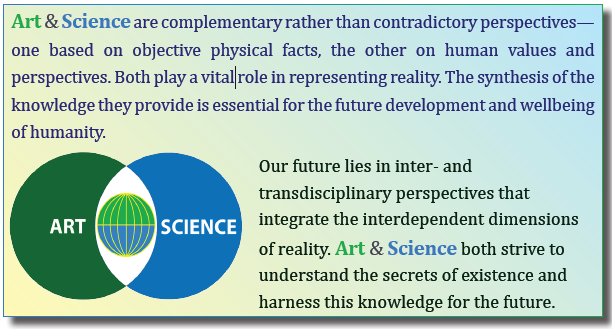
FUTURE EDUCATION
WORLD UNIVERSITY CONSORTIUM
Is it possible to design an affordable system of world-class education that is accessible to everyone everywhere? This is the question the Academy asked during an international conference at the United Nations Office at Geneva in June 2013. Our quest for such a system led to the founding of the World University Consortium (WUC). Since then, we have explored answers to this question at five international conferences organized by WAAS and WUC and other forums around the world and in a number of other insightful conversations. We are now in the process of synthesizing the rich learnings from these consultations to frame the contours for a new paradigm in education.
The education of the future must be based on a new approach that is contextual, transdisciplinary and integrated. It needs to integrate essential perspectives from the sciences and the arts and the physical and social sciences, unifying the objective and subjective dimensions of reality as well as different civilizational and cultural perspectives. Education is beginning to move beyond courses, to focus on the outcomes we want to produce, and the competencies and future skills we want our graduates to acquire.
Most important of these competencies is the capacity to think independently, to complement and complete abstract formulations of knowledge with contextual realism and application, to understand the limits to rationality and the ways to overcome its faulty premises, to reconcile apparent opposites and relate seemingly unconnected phenomena, to shift the focus from perspectives which compete and seek to reject one another to those which complement and complete one another.
Digital learning can facilitate synchronous and asynchronous, personalized and self-paced learning. It has opened up immense opportunities for evolving a new paradigm, including radical changes in knowledge delivery systems. The rapid changes effected by educational systems around the world in response to the COVID-19 pandemic confirm that time is right for radical innovation in delivery systems.
Separating knowledge transfer from evaluation and accreditation makes it possible to harness the capabilities of vast social resources which presently lie outside the formal educational system. It will also foster an environment in which the best educators can reach out to millions of people regardless of their institutional affiliations and students can choose from a global menu of knowledge offerings without being limited by institutional requirements. Higher education needs positive disruption. WAAS and WUC seek to be catalysts in bringing about this constructive change.

GLOBAL LEADERSHIP EDUCATION
Addressing global challenges demands a new conception of leadership, new strategies and a new type of education to prepare present and future leaders to handle the complex nexus of problems confronting humanity today. The Academy is engaged in efforts to synthesize ideas, examples and proposals generated by the UNOG-WAAS Global Leadership for the 21st Century project. Its aim is to create a leadership educational program that is transdisciplinary, integrated, personcentered, values-based, with a global perspective and equitably available to all. It is based on a multidimensional, multi-stakeholder, multi-sectoral conception of leadership which involves all fields, levels and aspects of a global society.
Leadership is a social process that seeks to convert the long, slow process of subconscious social evolution into a conscious process of rapid social transformation. Knowledge of the process is essential for this conversion. Leadership education needs to identify and comprehend the subjective social factors and forces which underlie and drive objective social change. It needs to identify ways to generate social awareness, release social aspirations and energies, and translate them into inspiring values and goals, and channel them through effective institutional mechanisms which convert the energies into effective power for change. Effective leadership can be achieved not only through the action of dynamic individuals but also through inspiring ideas, universal values, catalytic strategies, innovative organization, creative initiatives, and new measures.
The model of leadership that the world needs most is leadership which is seen more as a distributed function that exists in systems and offers support from behind the scenes. We need leaders to be connectors, facilitators and catalysers. The focus should be on the process of disseminating experiential as well as intellectual learning and creating a community of practitioners.
The pressure of multiple crises which threaten us makes this the best time for transformation. We need to explore new methods of delivery, assessment, accreditation, training, internship and employment. It needs to be done now because crises generate an intense pressure that compels people and organizations to overcome resistance to change, discard encrusted structures, and reinvent themselves.
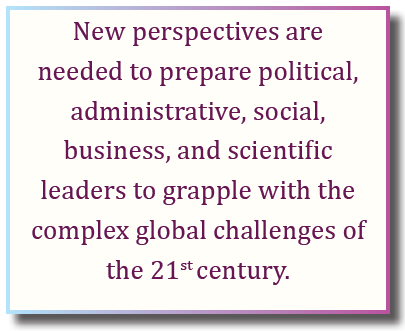
MIND, THINKING AND CREATIVITY
Mind is humanity’s highest developed instrument for seeking knowledge. It is the master tool that we use to comprehend the present, remember the past, and anticipate and plan for the future. From the act of striking two flints together to create fire to combining strings of 1s and 0s to design the code for supercomputers, mind has enabled humanity to create remarkable technologies and organized global institutions. The mind is the unifying foundation on which humanity’s entire social evolution is based. To understand this vital instrument better, the Academy has launched a ground-breaking project to explore Mind, Thinking and Creativity. A greater understanding of the nature of mind, its ways of knowing, the limits to thinking and rationality, mind’s untapped potential, the workings of creativity and genius are essential for addressing the challenges confronting humanity today.
The rational mind is the highest evolved status of human consciousness. However, the persistent intellectual and practical problems we confront today can be traced to the limitations of the mind. The problems are rooted in the way we use our minds—in the way we think. Our knowledge consists of fragmented, piecemeal, compartmentalized theories, when the reality we seek to understand is inclusive, complex and integrated. Our conceptions are based on mechanistic, static, inflexible equilibrium models, whereas the world we live in is alive, dynamic, organic, conscious, responsive, creative and continuously evolving. Our science assumes the poise of an impartial observer of objective reality, whereas all knowledge without exception is coloured by the subjective perspective of the observer. Our science strives to be neutral and value-free, whereas the knowledge we need should help us realize universal values. We need to evolve ways of thinking that reunite the objective and subjective dimensions of reality and reflect the integrality, dynamism and vibrancy of evolutionary nature. It is this challenge that the Academy is trying to address through its research, publications, conferences and roundtable series on the Mind. The apparent limitation of present knowledge is a reminder that the progress of knowledge depends on expanding our field of vision to encompass wider ranges of reality and deepening our perception from the observation of external appearances to integrate and unify the objective and subjective dimensions of reality. Through this study of Mind, Thinking and Creativity, the Academy aims to promote organic, integrated forms of thinking that will foster original thinking, creativity and intuitive ways of knowing, and thereby address the various crises that confront us today.
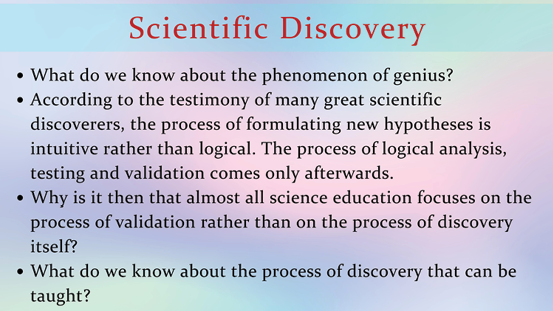
GLOBAL SOCIETY
THE PANDEMIC AS A SYSTEMIC CRISIS
The COVID-19 pandemic is the most acute global challenge in 75 years, touching all aspects of human existence all over the world. According to the UN Human Development Index, it has set the world back by ten years in all parameters. It has disproportionately affected disadvantaged populations, exposed geopolitical fault lines and deepened the underlying crisis of inequality. It forcefully reminds us that human security needs to be embedded in a planetary security concept that considers humanity as a part of life as a whole, and such holistic security will require a firm global commitment.
Lowering inequality is the best preparation for disaster prevention at all levels—global, national, or local. We need to invest more into building system resilience rather than pursuing efficiency to an extreme. We need more and better ways of regulating the system. We also need to reshape human behaviour. These are important to move from an economy that seeks to maximize efficiency towards one of increased and maximized equity and resilience.
We need global mental preparedness for change and adaptation. The preparedness for change is a precursor for real change. Willingness to learn and adapt to change, in collaboration with others who all may have a piece of the answer, is the key to mastering systemic challenges.
The world critically needs a more inclusive and comprehensive approach to policy-making, which will enhance our ability to cope with future crises such as climate change. The Academy is striving to promote a comprehensive multidisciplinary perspective and integrated multisectoral approach to addressing the crisis.
One such initiative is the COVID-19 Project of the Institute for Advanced Studies in Levant Culture and Civilization (ISACCL) in Bucharest, a WAAS Center of Excellence, which is inviting a wide range of experts from different fields to explore lessons and implications of the pandemic for the post-COVID-19 world.

YOUTH IN GLOBAL SOCIETY
WAAS has launched several initiatives to encourage and support the integration of youth more effectively in the Academy’s activities and in the multilateral system.
Youth and inter-generational communication both within WAAS and with the external world are important means of expanding the work of the Academy, strengthening inter-generational understanding, and identifying more effective ways to collaborate on joint initiatives for the common good.
Youth today can play a vital role in the multilateral system. Innovative strategies can be adopted to enhance the participation of youth in international organizations and to contribute ideas and participate in decision-making processes, especially those which directly impact on future generations.
WAAS encourages its younger members to build stronger bonds among themselves through networking groups, events and joint workshops. It also supports leaders in the Youth Leadership Network and various other youth organizations to form a global network of networks linking together youth organizations in different regions and across specialized areas of work. Such a Global Youth Network can strengthen youth organizations and movements, focus on common values and objectives to enhance the voice and power of youth in global and national decision-making, and equip them to successfully address the problems affecting humanity.

WAAS PUBLICATIONS
CULTURE AND SYSTEMIC CHANGE
The complex interdependence between global challenges is an expression of the intricate interlinkages between the underlying fields and forces from which they arise. Piecemeal solutions to each challenge are not feasible. Practical system change is needed through whole-system approaches that include both subjective and objective factors—physical, technological, economic, political, social, cultural, etc. Transformative participation, implementation of systems change initiatives and developing strategies for integrating group efforts are essential elements of a comprehensive strategy for global systems change.
Nature exhibits high levels of coordination, sophistication, productivity and resilience. Humanity has the potential to achieve the same high levels of prosperity and sustainability in society. This requires understanding the reality-based constraints under which we operate. The physical and non-physical laws of nature show what we need to do to survive and prosper. Clarifying the characteristics of a sustainable society illuminates the system changes needed to get from here to there. This in turn shows the high-level actions required in all major areas of society to bring about these changes.
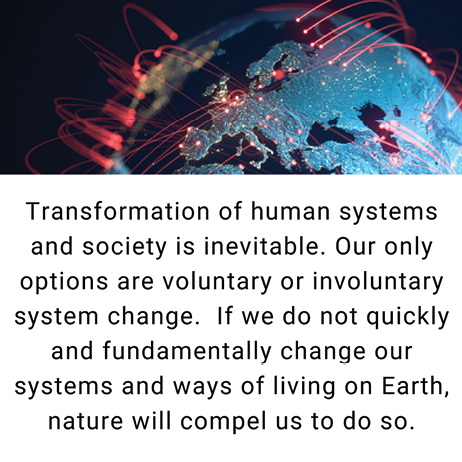
Taken together, these three factors—sustainable society characteristics, necessary system changes, and required actions—provide an objective, reality-based system change roadmap for human society. This high-level system change content—a clear understanding of the destination and path to get there—facilitates the development, coordination and implementation of system change processes, theories and other support mechanisms. Developing such a whole system framework will enable us to identify, correlate and integrate new narratives, models, and transformative practices, as well as facilitate the development of sustainable cultures.
WAAS is exploring new approaches to achieve practical system change through whole system approaches. The initiative seeks a deeper understanding of the process of social transformation, identification of desirable outcomes, formulation of catalytic strategies, and the designing of a systems-change map that highlights how people/groups can coordinate their efforts to optimize efforts to promote human development.
ETHICS AND INFORMATION: FROM BIOSPHERE TO GLOBAL SECURITY
The Anthropocene and the noosphere are two major paradigms that have begun to make sense at the global level, yet they have developed mostly in isolation from each other. The Anthropocene denotes the epoch dating from the commencement of substantial human impact on earth, while the noosphere refers to the stage of evolutionary development dominated by consciousness, mind and reason. A balanced understanding of global transformation will require the insights of both paradigms.
WAAS is exploring a paradigmatic dialogue between the two perspectives to construct an information society that is ethically sound. The founding motive of WAAS came from the awareness that academic knowledge cannot be separated from social responsibility for how that knowledge is used. Leading academics, scientists and artists came together to affirm that sense of responsibility for the common good of all humanity.
Today, nuclear weapons, pandemics and climate change are not the only threats confronting humanity. Withholding information or spreading incorrect or unethical information can undermine democracy, polarize citizens and disrupt the social fabric. WAAS seeks to identify effective ways to enhance systems that support information ethics.
Data doubles almost once every 12 hours. Growth in information has led to the fragmentation of knowledge into silos. This has created artificial boundaries between people, countries, and all aspects of life, and resulted in the world’s wicked problems. Complexity is the foundation of life and life expresses itself through relationships, not in silos.
We need to move from the shackles of rigid forms and systems to the freedom of true knowledge. We need to overcome our sense of separation from each other and the world, as well as the separation between ethics, epistemology and ontology.
Traditional scientific discourse too often ignores ethical considerations. This needs to change. For example, technical education in artificial intelligence needs to include knowledge regarding the potential misuses, abuses and negative social consequences of AI. Scientists must consider the consequences of scientific theories, data and conclusions, and take responsibility for the social impact of science.
While new and dynamic channels of information are capable of distorting perceptions and waging information warfare, the same system also empowers civil society and youth groups to rise against abuse of power and demand accountability.
Society needs systems to navigate and discriminate the proliferating minefields of falsehood, fake news and unethical science.
SOCIAL RESPONSIBILITY OF MEDIA AND THE FUTURE OF INFORMATION
A global monitoring and ranking system prepared by impartial experts to evaluate the objectivity, neutrality and reliability of information from major news services could provide recognition to publications with the highest standards and provide readers with valuable assistance in their selection of news sources.
WAAS is exploring possible models and means for promoting global standards and measures for news journalism and social media as essential for protecting human rights and promoting effective decision-making, mature democracies and social cohesion.
As media becomes more globalized, decentralized, and powerful, its responsibility goes beyond providing news alone. It must foster media literacy, so readers learn how to understand, assess and interpret news intelligently. Clear communication and accurate and unbiased reporting are vital, but not sufficient. Readers need meta news or news about the news, so they learn the governance and political theory behind policy and decision making. If the media can enhance their capacity for critical thinking, understanding complexity, and identifying the truth, it will make global society more resilient to propaganda, biased narratives and misinformation.
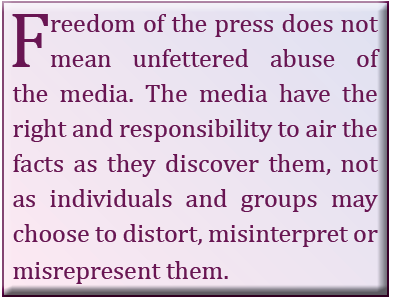
Current models of social media lend themselves easily to be exploited by propagandists. They need to become more accountable. Anonymity, which is intended to protect freedom of speech from persecution, becomes an instrument for falsification, which permeates and undermines the credibility of all information flows. The challenge is to reconcile freedom of expression with measures that safeguard the rights of the public and individuals to reliable, responsible communications. We need to provide alternative funding mechanisms, so the commercial and transactional nature of news are kept apart. Objective news reporting needs to be insulated from the pressure of financial and political interests. As media has become increasingly interactive and integrated, it is now possible to identify and manipulate people’s biological and emotional responses to the content they read. We need to set the balance between accountability and capacity, and between government control, fundamental freedoms and the technologies that will be integrated with communication media.
LIST OF CONTRIBUTORS
- Janani RAMANATHAN, Senior Research Associate, Mother’s Service Society, India; FWAAS; EDITOR OF WAAS@60 REPORT
- Carlos ALVAREZ-PEREIRA, Member, Executive Committee, Club of Rome; FWAAS
- Yul ANDERSON, President & Founder, African-American Future Society, USA; AFWAAS
- Jana AMIN, Intern, Dr. Alaa Murabit, Harvard Radcliffe Fellow; JFWAAS
- Nadeem AMMAR, Founder, OHR Foundation, Israel
- Almas AWAN, Executive Committee, Global Young Academy (GYA)
- Goran BANDOV, Associate Professor, University of Zagreb; AFWAAS
- Nadine BLOCH, Training Director, Beautiful Trouble
- Saulo Jose Casali BAHIA, Federal Judge, Brazil; Trustee, WAAS
- Dorothee BARGSTÄDT, Associate Political Affairs Officer, UNOG
- Kehkashan BASU, Founder & President, Green Hope Foundation
- Nora BATESON, President, International Bateson Institute, Sweden; FWAAS
- Liberato BAUTISTA, President, CoNGO
- Shoshana BEKERMAN, Founder & Director, Inter Parliamentary Coalition for Global Ethics; AFWAAS
- Olena BEKRENIOVA, Director, Bohdan Hawrylyshyn Family Foundation; AFWAAS
- Azita BERAR-AWAD, International Advisor on Global Governance, Development, Employment and Social Policy; FWAAS
- Sheldon M. BERLOW, Director, University at Buffalo Foundation; FWAAS
- Olivia BINA, Principal Researcher, University of Lisbon; FWAAS
- Katalin BOGYAY, 15th UN Ambassador of Hungary; President, UNESCO’s 36th General Conference; FWAAS
- Irina BOKOVA, Director General, UNESCO (2009-2017)
- Kathlena Walther BOUMA, Special Advisor to Group Chairman, Econet Foundation; FWAAS
- Mariana BOZESAN, Co-founder and President, AQAL Capital, Germany; FWAAS
- Stefan BRUNNHUBER, Medical Director, Diakonie Hospital, Germany; Trustee, WAAS
- Andreas BUMMEL, Co-founder & Executive Director, Democracy Without Borders; FWAAS
- João CARAÇA, Senior Advisor, Calouste Gulbenkian Foundation; FWAAS
- Amnon CARMI, Professor, University of Haifa, Israel; UNESCO Chair in Bioethics
- Chantal-Line CARPENTIER, Chief, UN Conference on Trade & Development, New York; FWAAS
- Maria da Graça CARVALHO, Member of the European Parliament; FWAAS
- Yi-Heng CHENG, Professor, Tongji University, Shanghai, China; FWAAS
- David CHIKVAIDZE, Chef de Cabinet of the Director General of UNOG at Geneva; FWAAS
- Susan CLARK, Adjunct Professor, School of Forestry & Environmental Studies; FWAAS
- Emil CONSTANTINESCU, President of Romania (1996-2000); President, Institute for Advanced Studies in Levant Culture and Civilization; Trustee, WAAS
- Jodi CULLITY, Head of Partnerships, Youth Leadership Network
- Dora DAMJANOVIC, Founder, Youth Leadership Network; JFWAAS
- Momir ĐUROVIĆ, Former President, Montenegrin Academy of Sciences and Arts; Trustee, WAAS
- Dina DRAGIJA, Founder & Vice President, Youth Leadership Network; JFWAAS
- Frank DIXON, Founder, Global System Change; FWAAS
- Dragan DJURICIN, Professor of Economics, University of Belgrade, FWAAS
- Piero DOMINICI, Scientific Director, International Research and Education Programme on Human Complex Systems; AFWAAS
- Jan W. DOBROWOLSKI, Head, AGH-University of Science and Technology, Poland; FWAAS
- Federica DONATI, Member, Youth Leadership Network; JFWAAS
- Antonio de Araujo FREITAS Jr., Provost, FGV for Research and Graduate Studies, Brazil; FWAAS
- Jerome GLENN, Co-founder & CEO, The Millennium Project; FWAAS
- Fadwa EL GUINDI, Retiree Anthropologist at the University of California, Los Angeles; Trustee, WAAS
- Jüri ENGELBRECHT, Former President, Estonian Academy of Sciences; Trustee, WAAS
- Gérard ESCHER, Advisor to the Board, Geneva Science and Diplomacy Anticipator
- Maria ESPINOSA, President, 73rd Session of the United Nations General Assembly; FWAAS
- Lloyd ETHEREDGE, Director, Policy Sciences Center, FWAAS
- Flávia FERREIRA PIRES, Member of the Global Young Academy
- Catherine FIANKAN-BOKONGA, Senior UN Correspondent; FWAAS
- Rodolfo FIORINI, Emeritus Professor, Politecnico di Milano University; Trustee, WAAS
- Faris GAVRANKAPETANOVIĆ, Professor, University of Sarajevo, Bosnia & Herzegovina; FWAAS
- Barry GILLS, Professor, Global Development Studies, University of Helsinki, Finland; FWAAS
- Jonathan GRANOFF, President, Global Security Institute; FWAAS
- Heron José de Santana GORDILHO, Professor, Federal University of Bahia, Brazil; FWAAS
- Lidiya GRIGOREVA, Head, NGO Liaison Unit, Director-General Office, UNOG
- Suvai GUNASEKARAN, Science Policy Interface Coordinator, UNMGCY
- Ameenah GURIB-FAKIM, President of Mauritius (2015-2018); Member, NGIC
- Orhan GÜVENEN, Former Ambassador of Turkey to OECD; FWAAS
- David HARRIES, Principal, Security and Sustainability Guide; FWAAS
- Hazel HENDERSON, Founder, Ethical Markets Media, USA; FWAAS
- Sue HENDERSON, President, New Jersey City University
- Vanessa HERNÁNDEZ, Youth Mentor at POP Movement
- Erich HOEDL, Former Vice President of the European Academy of Sciences and Arts; Trustee, WAAS
- Robert HORN, Senior Researcher, Stanford University; FWAAS
- Garry JACOBS, President & CEO, World Academy of Art & Science
- Ivo JOSIPOVIĆ, President of Croatia (2010-15); FWAAS; Member, NGIC
- Yehuda KAHANE, Chairman & Co-founder, YK Center; Trustee, WAAS
- Anja KASPERSEN, Senior Fellow, Carnegie Council for Ethics in International Affairs
- Donato KINIGER-PASSIGLI, Vice President, World Academy of Art & Science
- Witold KINSNER, Professor, University of Manitoba; FWAAS
- Marcin KILANOWSKI, Professor, Nicolaus Copernicus University, Poland
- Phoebe KOUNDOURI, President, European Association of Environmental and Resource Economists; FWAAS
- Petra KUENKEL, Member, Executive Committee, Club of Rome
- Krishan LAL, Co-chair, IAP Science, India
- Zlatko LAGUMDŽIJA, Prime Minister of Bosnia & Herzegovina (2001-2002); FWAAS; Member, NGIC
- Ivana LAZAROVSKI, Associate, NALED; JFWAAS
- Grażyna LEŚNIAK-ŁEBKOWSKA, Professor, Warsaw School of Economics, Poland; AFWAAS
- Carlo LUCIANI, Founder & Co-President, Youth Leadership Network; JFWAAS
- Pavel LUKSHA, Founder & Director, Global Education Futures; AFWAAS
- Daphna MARGOLIN, Eco-Tech artist; FWAAS
- Luvuyo MADASA, Executive Director, ReimagineSA NPC; JFWAAS
- Samantha MANAUSA, Research Assistant to Professor Nagan, Levin College of Law, University of Florida; JFWAAS
- Michael MARIEN, Senior Principal, Security and Sustainability Guide; FWAAS
- Peter McGRATH, Executive Director, InterAcademy Partnership
- Peta MILAN, Director, Transcendent Media Capital; AFWAAS
- Michael MØLLER, Chair, Diplomacy Forum, Geneva Science and Diplomacy Anticipator; FWAAS
- Winston NAGAN, Chairman Emeritus, Board of Trustees, World Academy of Art & Science
- Marta NEŠKOVIĆ, Doctoral Student, University of Belgrade, Serbia; JFWAAS
- Nebojša NEŠKOVIĆ, Secretary General, World Academy of Art & Science
- Joanna NURSE, Strategic Advisor, InterAction Council
- Ketan PATEL, CEO & Founder, Greater Pacific Capital; FWAAS
- Ole H PETERSEN, Board Member, Science Advice for Policy by European Academies (SAPEA)
- Mila POPOVICH, Member, WAAS Executive Committee
- Remus PRICOPIE, President, World University Consortium; FWAAS
- Mamphela RAMPHELE, Co-president, Club of Rome; FWAAS
- Ortwin RENN, Chair, MASOS Working Committee, SAPEA
- Thomas REUTER, Professor, University of Melbourne, Australia; Trustee, WAAS
- Bartolomé RIBAS OZONAS, Associate Professor, Complutense University of Madrid; FWAAS
- Simone ROMANO, National Coordinator, MSOI UNYA, Italy
- Raffaele ROSSI, Founder & Director, STEP ONE Productions
- Neantro SAAVEDRA-RIVANO, Professor Emeritus, University of Tsukuba, Japan; FWAAS
- Alia SABRA, Member of Young ESCWA
- Roberto SAVIO, Patron, World Sustainability Forum
- Yury SAYAMOV, Professor, Lomonosov Moscow State University, Russia; FWAAS
- Serena SCAPAGNINI, Visual Artist
- Sergio SCAPAGNINI, President & Founder, Indrapur Cinematografica; AFWAAS
- Ullica SEGERSTRÅLE, Professor, Illinois Institute of Technology; FWAAS
- Kakha SHENGELIA, President, IAUP; Director, WUC; FWAAS
- Julene SIDDIQUE, Socio-Systemic Impact Specialist, Laszlo Institute; AFWAAS
- Ivo ŠLAUS, Honorary President, World Academy of Art and Science
- Kenneth STOKES, President, World Sustainability Forum
- Margianta SURAHMAN JUHANDA DINATA, Founder and Executive Director of Emancipate Indonesia
- Pavlina R. TCHERNEVA, Associate professor of Economics, Bard College
- Georgios THEODOROPOULOS, Chair Professor, Dept. of Computer Science & Engineering, SUSTech
- Mariana TODOROVA, Assistant Professor, Bulgarian Academy of Sciences; FWAAS
- Tibor TÓTH, Executive Secretary Emeritus, Comprehensive Nuclear Test-Ban Treaty Organization; Trustee, WAAS
- Marcel VAN DE VOORDE, Professor, Delft University of Technology, Belgium; Trustee, WAAS
- Vaira VĪĶE-FREIBERGA, President of Latvia (1999-2007); FWAAS; Co-Chair, NGIC
- Marco VITIELLO, Founder & Head of Finance, Youth Leadership Network; JFWAAS
- Adelina VON FÜRSTENBERG, President & Founder, ART for The World; FWAAS
- Vesna VUČINIĆ, Faculty of Philosophy, University of Belgrade; FWAAS
- Dušan VUJOVIĆ, Chairman, NALED Research Council; FWAAS
- Alyn WARE, Global Coordinator, Parliamentarians for Nuclear Non-proliferation and Disarmament; FWAAS
- Isaac WITZ, Editor, Biochemical and Biophysical Research Communications, Tel Aviv University, Israel; FWAAS
- Ralph WOLFF, Founder and President, The Quality Assurance Commons; FWAAS
- Moneef R. ZOU’BI, Director General, Islamic World Academy of Sciences, Jordan (1998-2019); FWAAS
- Angela WILKINSON, Secretary General and CEO, World Energy Council; FWAAS
- Aleksander ZIDANŠEK, Professor, Jožef Stefan International Postgraduate School; FWAAS
- Abdul Hamid ZAKRI, Chairman, Atri Advisory; Science Advisor to the Prime Minister of Malaysia (2010-2018); FWAAS
- Jinfeng ZHOU, Secretary-General of China Biodiversity Conservation and Green Development Foundation (CBCGDF)
- Alberto ZUCCONI, Chairman of the Board of Trustees, WAAS; Secretary General, WUC
- Ibon ZUGASTI, Member, Board of Directors, The Millennium Project; AFWAAS

